|
The Ten Commandments, American History,
and American Law
By
 - August 3, 2005
- August 3, 2005
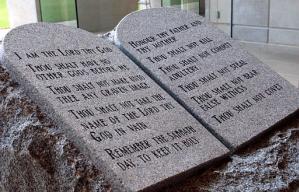
There have been increasing attempts in recent years to post the Ten Commandments on government
property. The locations favored by Ten Commandment advocates have typically
been schools and court houses. The rationale used to support these attempts
has been the claim that the Ten Commandments are an important part of
American history and form the foundation of American law. The claim has also
been made that the Ten Commandments are the first recorded laws.
In reality, there are many facts that contradict the claims
of Ten Commandment proponents, not the least of which being the fact that
the Biblical text of the commandments does not match their popular
presentation. In fact, there are three distinctly different accounts of the
commandments in the Old Testament/Torah, and each of these accounts are
different among different translations of the commandments. A popular
American representation of the Ten Commandments is as follows:
I Am the LORD thy God.
- Thou shalt have no other gods before me.
- Thou shalt not make graven images.
- Thou shalt not use the Lord's name in vain.
- Remember the Sabbath day, to keep it holy.
- Honor thy mother and thy father.
- Thou shalt not kill.
- Thou shalt not commit adultery.
- Thou shalt not steal.
- Thou shalt not bear false witness against thy neighbor.
- Thou shalt not covet thy neighbor's property.
Really understanding the commandments, however, requires more than
just knowing the popular portrayal of the commandments, it requires knowing the whole story.
The Biblical Account of the Ten Commandments
According to the Bible, after leading the Israelites out of
slavery in Egypt, God met with Moses on Mount Sinai, where he instructed
Moses to introduce his people to him so that he could form a covenant with
them.
Exodus 19
9 The LORD said to Moses, "I am going
to come to you in a dense cloud, so that the people will hear me
speaking with you and will always put their trust in you." Then Moses
told the LORD what the people had said.
10 And the LORD said to Moses, "Go to
the people and consecrate them today and tomorrow. Have them wash their
clothes 11 and be ready by the third day,
because on that day the LORD will come down on Mount Sinai in the sight
of all the people. 12 Put limits for the
people around the mountain and tell them, 'Be careful that you do not go
up the mountain or touch the foot of it. Whoever touches the mountain
shall surely be put to death. 13 He shall
surely be stoned or shot with arrows; not a hand is to be laid on him.
Whether man or animal, he shall not be permitted to live.' Only when the
ram's horn sounds a long blast may they go up to the mountain."
20 The LORD descended to the top of
Mount Sinai and called Moses to the top of the mountain. So Moses went
up 21 and the LORD said to him, "Go down and
warn the people so they do not force their way through to see the LORD
and many of them perish. 22 Even the
priests, who approach the LORD, must consecrate themselves, or the LORD
will break out against them."
25 So Moses went down to the people
and told them.
This is the stage upon which the giving of the commandments to the
Israelites by God was set. The following text, from Exodus 20 (Protestant
version), is the text that is used as the basis for the popular Christian
version of the Ten Commandments.
Exodus 20
1 And God spoke all these words:
2 "I am the LORD your God, who
brought you out of Egypt, out of the land of slavery.
3 "You shall have no other gods
before me.
4 "You shall not make for yourself an
idol in the form of anything in heaven above or on the earth beneath or
in the waters below. 5 You shall not bow
down to them or worship them; for I, the LORD your God, am a jealous
God, punishing the children for the sin of the fathers to the third and
fourth generation of those who hate me, 6
but showing love to a thousand {generations} of those who love me and
keep my commandments.
7 "You shall not misuse the name of
the LORD your God, for the LORD will not hold anyone guiltless who
misuses his name.
8 "Remember the Sabbath day by
keeping it holy. 9 Six days you shall labor
and do all your work, 10 but the seventh day
is a Sabbath to the LORD your God. On it you shall not do any work,
neither you, nor your son or daughter, nor your manservant or
maidservant, nor your animals, nor the alien within your gates.
11 For in six days the LORD made the heavens
and the earth, the sea, and all that is in them, but he rested on the
seventh day. Therefore the LORD blessed the Sabbath day and made it
holy.
12 "Honor your father and your
mother, so that you may live long in the land the LORD your God is
giving you.
13 "You shall not murder.
14 "You shall not commit adultery.
15 "You shall not steal.
16 "You shall not give false
testimony against your neighbor.
17 "You shall not covet your
neighbor's house. You shall not covet your neighbor's wife, or his
manservant or maidservant, his ox or donkey, or anything that belongs to
your neighbor."
18 When the people saw the thunder
and lightning and heard the trumpet and saw the mountain in smoke, they
trembled with fear. They stayed at a distance 19
and said to Moses, "Speak to us yourself and we will listen. But do not
have God speak to us or we will die."
20 Moses said to the people, "Do not
be afraid. God has come to test you, so that the fear of God will be
with you to keep you from sinning."
21 The people remained at a distance,
while Moses approached the thick darkness where God was.
As you can see, the full text of the commandments is quite different, and
indeed carries different meaning, from the popularly portrayed
versions. This, however, is really just the beginning of the problems with
the Ten Commandments story.
At this point no stone tablets have been created. The only thing that has
happened is that God has spoken these commandments to the Israelites. We
know that God is speaking directly to the Israelites because he
specifically says "I am the LORD your God, who brought you out of Egypt,
out of the land of slavery." The details of this statement are
conveniently left out by Christians. In fact, the actual Hebrew reads more
correctly as follows: I am Yahweh thy God which brought thee out of
Egypt, House of Bondage. There is a distinct difference between the word
Lord and the name Yahweh in Hebrew. The original Hebrew text reads Yahweh.
After having spoken the commandments to the Israelites, God then asked
Moses to have the Israelites make an alter for him so that they could
sacrifice animals to him, and then Moses was instructed to come back to the
mountain. On the mountain, as the story goes, God then gave Moses a set of laws, which
have come to be known as
Mosaic law.
Exodus 21:1 "These are the laws you are
to set before them:
These laws cover many different issues. Approximately 42 laws were
listed in all, covering issuing ranging from sex to food handling to social
justice. The punishment God proscribed for the violation of the majority of
the laws was death. Moses returned to the people and told them of the laws
and the people agreed to obey the laws. God then instructed Moses to return
to the mountain again, where he would write the laws in stone for him.
Exodus 24:12 The LORD said to Moses,
"Come up to me on the mountain and stay here, and I will give you the
tablets of stone, with the law and commands I have written for their
instruction."
Moses then returned Mount Sinai and God gave him more instructions. After
40 days and 40 nights God completed the tablets and sent Moses back down to
the Israelites.
Exodus 31:18 When the LORD finished
speaking to Moses on Mount Sinai, he gave him the two tablets of the
Testimony, the tablets of stone inscribed by the finger of God.
This is the account of the creation of the stone tablets, and as you can
see, according to The Bible, the stone tablets contained not just the commandments, but all of
the laws and all of his instructions. Later in The Bible/Torah we are told that the tablets were
written on both sides, front and back.
Yet, there is still more to the story.
While Moses was gone the people got restless.
Exodus 32:
1 When the people saw that Moses was
so long in coming down from the mountain, they gathered around Aaron and
said, "Come, make us gods who will go before us. As for this fellow
Moses who brought us up out of Egypt, we don't know what has happened to
him."
7 Then the LORD said to Moses, "Go
down, because your people, whom you brought up out of Egypt, have become
corrupt. 8 They have been quick to turn away
from what I commanded them and have made themselves an idol cast in the
shape of a calf. They have bowed down to it and sacrificed to it and
have said, 'These are your gods, O Israel, who brought you up out of
Egypt.'
Again we get an account of the tablets:
Exodus 32:15 Moses turned and went down
the mountain with the two tablets of the Testimony in his hands. They
were inscribed on both sides, front and back. 16
The tablets were the work of God; the writing was the writing of God,
engraved on the tablets.
Upon returning to his people, Moses found that they were worshiping a
golden calf, like the Egyptians did, and that they were dancing and singing.
Moses then destroyed the stone tablets out of anger.
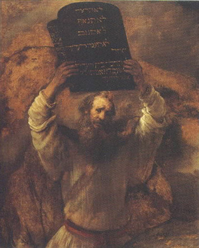
Exodus 32:19 When Moses approached the
camp and saw the calf and the dancing, his anger burned and he threw the
tablets out of his hands, breaking them to pieces at the foot of the
mountain. 20 And he took the calf they had
made and burned it in the fire; then he ground it to powder, scattered
it on the water and made the Israelites drink it.
After destroying the tablets Moses orchestrated a slaughter of the people
in the name of God:
Exodus 32:
25 Moses saw that the people were
running wild and that Aaron had let them get out of control and so
become a laughingstock to their enemies. 26
So he stood at the entrance to the camp and said, "Whoever is for the
LORD, come to me." And all the Levites rallied to him.
27 Then he said to them, "This is
what the LORD, the God of Israel, says: 'Each man strap a sword to his
side. Go back and forth through the camp from one end to the other, each
killing his brother and friend and neighbor.' " 28
The Levites did as Moses commanded, and that day about three thousand of
the people died. 29 Then Moses said, "You
have been set apart to the LORD today, for you were against your own
sons and brothers, and he has blessed you this day."
30 The next day Moses said to the
people, "You have committed a great sin. But now I will go up to the
LORD; perhaps I can make atonement for your sin."
31 So Moses went back to the LORD and
said, "Oh, what a great sin these people have committed! They have made
themselves gods of gold. 32 But now, please
forgive their sin—but if not, then blot me out of the book you have
written."
It is important to note that the sin the people are said to have
committed was worshiping a golden idol, not killing their family members and
friends. Indeed, the slaughter of their own family members and friends was
seen as a form of redemption for their sins. Interestingly, one of the
commandments given by God was not to murder, yet within days of the giving
of the commandments Moses ordered the people to commit murder in the name
of God as a form of redemption.
After redeeming the people before God, Moses was instructed by God to make two
new stone tablets upon which he would re-write the commandments. As with
other texts in the Old Testament, the words "the LORD" have been used to
replace the Hebrew name Yahweh. This is evident in the following passages
since the use of "the LORD" doesn't really make sense in context in some
places.
Exodus 34 1 The LORD said to
Moses, "Chisel out two stone tablets like the first ones, and I will
write on them the words that were on the first tablets, which you broke.
2 Be ready in the morning, and then come up
on Mount Sinai. Present yourself to me there on top of the mountain.
3 No one is to come with you or be seen
anywhere on the mountain; not even the flocks and herds may graze in
front of the mountain."
4 So Moses chiseled out two stone
tablets like the first ones and went up Mount Sinai early in the
morning, as the LORD had commanded him; and he carried the two stone
tablets in his hands. 5 Then the LORD came
down in the cloud and stood there with him and proclaimed his name, the
LORD. 6 And he passed in front of Moses,
proclaiming, "The LORD, the LORD, the compassionate and gracious God,
slow to anger, abounding in love and faithfulness,
7 maintaining love to thousands, and forgiving wickedness,
rebellion and sin. Yet he does not leave the guilty unpunished; he
punishes the children and their children for the sin of the fathers to
the third and fourth generation."
8 Moses bowed to the ground at once
and worshiped. 9 "O Lord, if I have found
favor in your eyes," he said, "then let the Lord go with us. Although
this is a stiff-necked people, forgive our wickedness and our sin, and
take us as your inheritance."
10 Then the LORD said: "I am making a
covenant with you. Before all your people I will do wonders never before
done in any nation in all the world. The people you live among will see
how awesome is the work that I, the LORD, will do for you.
11 Obey what I command you today. I will
drive out before you the Amorites, Canaanites, Hittites, Perizzites,
Hivites and Jebusites. 12 Be careful not to
make a treaty with those who live in the land where you are going, or
they will be a snare among you. 13 Break
down their altars, smash their sacred stones and cut down their Asherah
poles.
14 Do not worship any
other god, for the LORD, whose name is Jealous, is a jealous God.
15 "Be careful not to make a treaty
with those who live in the land; for when they prostitute themselves to
their gods and sacrifice to them, they will invite you and you will eat
their sacrifices. 16 And when you choose
some of their daughters as wives for your sons and those daughters
prostitute themselves to their gods, they will lead your sons to do the
same.
17 "Do not make cast idols.
18 "Celebrate the Feast of Unleavened
Bread. For seven days eat bread made without yeast, as I commanded you.
Do this at the appointed time in the month of Abib, for in that month
you came out of Egypt.
19 "The first offspring of every womb
belongs to me, including all the firstborn males of your livestock,
whether from herd or flock. 20 Redeem the
firstborn donkey with a lamb, but if you do not redeem it, break its
neck. Redeem all your firstborn sons.
"No one is to appear before me empty-handed.
21 "Six days you shall labor, but on
the seventh day you shall rest; even during the plowing season and
harvest you must rest.
22 "Celebrate the Feast of Weeks with
the firstfruits of the wheat harvest, and the Feast of Ingathering at
the turn of the year. 23 Three times a year
all your men are to appear before the Sovereign LORD, the God of Israel.
24 I will drive out nations before you and
enlarge your territory, and no one will covet your land when you go up
three times each year to appear before the LORD your God.
25 "Do not offer the blood of a
sacrifice to me along with anything containing yeast, and do not let any
of the sacrifice from the Passover Feast remain until morning.
26 "Bring the best of the firstfruits
of your soil to the house of the LORD your God.
"Do not cook a young goat in its mother's milk."
27 Then the LORD said to Moses,
"Write down these words, for in accordance with these words I have made
a covenant with you and with Israel." 28
Moses was there with the LORD forty days and forty nights without eating
bread or drinking water. And he wrote on the tablets the words of the
covenant—the Ten Commandments.
This is the first time that the phrase "Ten Commandments" is used in the
Bible/Torah. As to why these ten commandments are different than the first
set of commandments, there is no explanation that complies with a literal
interpretation of the texts. The scholarly explanation is that the text is a
compilation of works from different authors written at different
times.
To add to the confusion, the beginning of the passage states that God
said he would write on the tablets and the end of the passage has God
telling Moses to do the writing.
The Bible then states that Moses placed these Ten Commandments in the Ark
of the Covenant, so, if the Bible is to be taken as a literal truth,
if the Ark of the Covenant were ever to be found these are the
commandments that would be found in it - to the surprise of many a Christian
one would assume.
To recap so far: The first account of the creation of the stone tablets
by God states that the tablets contained the entire testimony of God, which
included his Commandments, his laws, and his requests for the building of
certain things such as lamps and arks, etc. These tablets were destroyed by
Moses. The second account of the stone tablets states that only the Ten
Commandments are on the tablets, but the commandments listed are very
different than the first set.
There is yet one more account of the Ten Commandments however. There is
a second telling of the story of the Ten Commandments in the Bible in
Deuteronomy, where Moses recounts the original events. The commandments
given in Deuteronomy are much closer to the first set of commandments, but
still not exactly the same. They are as follows:
Deuteronomy 5:
6 "I am the LORD your God, who
brought you out of Egypt, out of the land of slavery.
7 "You shall have no other gods
before me.
8 "You shall not make for yourself an
idol in the form of anything in heaven above or on the earth beneath or
in the waters below. 9 You shall not bow
down to them or worship them; for I, the LORD your God, am a jealous
God, punishing the children for the sin of the fathers to the third and
fourth generation of those who hate me, 10
but showing love to a thousand generations of those who love me and keep
my commandments.
11 "You shall not misuse the name of
the LORD your God, for the LORD will not hold anyone guiltless who
misuses his name.
12 "Observe the Sabbath day by
keeping it holy, as the LORD your God has commanded you.
13 Six days you shall labor and do all your
work, 14 but the seventh day is a Sabbath to
the LORD your God. On it you shall not do any work, neither you, nor
your son or daughter, nor your manservant or maidservant, nor your ox,
your donkey or any of your animals, nor the alien within your gates, so
that your manservant and maidservant may rest, as you do.
15 Remember that you were slaves in Egypt
and that the LORD your God brought you out of there with a mighty hand
and an outstretched arm. Therefore the LORD your God has commanded you
to observe the Sabbath day.
16 "Honor your father and your
mother, as the LORD your God has commanded you, so that you may live
long and that it may go well with you in the land the LORD your God is
giving you.
17 "You shall not murder.
18 "You shall not commit adultery.
19 "You shall not steal.
20 "You shall not give false
testimony against your neighbor.
21 "You shall not covet your
neighbor's wife. You shall not set your desire on your neighbor's house
or land, his manservant or maidservant, his ox or donkey, or anything
that belongs to your neighbor."
Following this Moses retells the story of the creation of the second set
of commandments:
Deuteronomy 10:
1 At that time the LORD said to me,
"Chisel out two stone tablets like the first ones and come up to me on
the mountain. Also make a wooden chest. 2 I
will write on the tablets the words that were on the first tablets,
which you broke. Then you are to put them in the chest."
3 So I made the ark out of acacia
wood and chiseled out two stone tablets like the first ones, and I went
up on the mountain with the two tablets in my hands.
4 The LORD wrote on these tablets what he
had written before, the Ten Commandments he had proclaimed to you on the
mountain, out of the fire, on the day of the assembly. And the LORD gave
them to me. 5 Then I came back down the
mountain and put the tablets in the ark I had made, as the LORD
commanded me, and they are there now.
This retelling has God writing the second set of Commandments, not Moses.
For Christians, however, some or all (depending on your interpretation)
of Mosaic law was overruled by Jesus. In the New Testament Jesus mentions
commandments, but he never specifically mentions the Ten Commandments, and
Jesus actually gives a different interpretation of the commandments. Here is
what is said about the commandments in the New Testament:
Romans 13:
9The
commandments, "Do not commit adultery," "Do not murder," "Do not steal,"
"Do not covet," and whatever other commandment there may be, are summed
up in this one rule: "Love your neighbor as yourself."
10Love does no harm to its neighbor.
Therefore love is the fulfillment of the law.
Mark 12:
28One of the teachers of the law came
and heard them debating. Noticing that Jesus had given them a good
answer, he asked him, "Of all the commandments, which is the most
important?"
29"The most important one," answered
Jesus, "is this: 'Hear, O Israel, the Lord our God, the Lord is one.
30Love the Lord your God with all your
heart and with all your soul and with all your mind and with all your
strength.' 31The second is this: 'Love your
neighbor as yourself.' There is no commandment greater than these."
These statements certainly seem to trivialize the importance of the Ten
Commandments. Jesus himself doesn't even elaborate on or state all of the
commandments, indeed he doesn't even appear to know them all. He says that
they aren't really that important anyway as long as you love God and your
neighbor. The overall message makes sense. Why worry about specific
commandments regarding murder, adultery, theft, etc, when the main point of
all of them is "do unto others as you would have others do unto you". If you
go by that rule then all the other commandments fall into place. Of course
these guidelines cannot be called laws, they are just principles to live by.
That all makes sense, so why is it then that Christians are so
obsessed with the Ten Commandments when Jesus claims in the New Testament
that the commandments themselves aren't important?
The New Testament states that Jesus is creating a new covenant with the
people:
Hebrews 9:
15For this reason Christ is the
mediator of a new covenant, that those who are called may receive the
promised eternal inheritance—now that he has died as a ransom to set
them free from the sins committed under the first covenant.
The Ten Commandments are a part of the old covenant, so again, for
Christians these commandments should be without importance.
Furthermore, Jesus gives new sets of commandments in the New Testament
(edited for length):
Matthew 5:
Murder:
21"You have heard that
it was said to the people long ago, 'Do not murder, and anyone who
murders will be subject to judgment.' 22But
I tell you that anyone who is angry with his brother will be subject to
judgment. Again, anyone who says to his brother, 'Raca,' is answerable
to the Sanhedrin. But anyone who says, 'You fool!' will be in danger of
the fire of hell.
Adultery:
27"You have heard that it was said, 'Do
not commit adultery.' 28But I tell you that
anyone who looks at a woman lustfully has already committed adultery
with her in his heart. 29If your right eye
causes you to sin, gouge it out and throw it away. It is better for you
to lose one part of your body than for your whole body to be thrown into
hell. 30And if your right hand causes you
to sin, cut it off and throw it away. It is better for you to lose one
part of your body than for your whole body to go into hell.
Divorce:
31"It has been said, 'Anyone who
divorces his wife must give her a certificate of divorce.'
32But I tell you that anyone who divorces
his wife, except for marital unfaithfulness, causes her to become an
adulteress, and anyone who marries the divorced woman commits adultery.
Oaths:
33"Again, you have heard that it was
said to the people long ago, 'Do not break your oath, but keep the oaths
you have made to the Lord.' 34But I tell
you, Do not swear at all: either by heaven, for it is God's throne;
35or by the earth, for it is his footstool;
or by Jerusalem, for it is the city of the Great King.
36And do not swear by your head, for you
cannot make even one hair white or black. 37Simply
let your 'Yes' be 'Yes,' and your 'No,' 'No'; anything beyond this comes
from the evil one.
An Eye for an Eye:
38"You have heard that it was said,
'Eye for eye, and tooth for tooth.' 39But I
tell you, Do not resist an evil person. If someone strikes you on the
right cheek, turn to him the other also. 40And
if someone wants to sue you and take your tunic, let him have your cloak
as well. 41If someone forces you to go one
mile, go with him two miles. 42Give to the
one who asks you, and do not turn away from the one who wants to borrow
from you.
Love for Enemies:
43"You have heard that it was said,
'Love your neighbor and hate your enemy.' 44But
I tell you: Love your enemies and pray for those who persecute you,
45that you may be sons of your Father in
heaven. He causes his sun to rise on the evil and the good, and sends
rain on the righteous and the unrighteous.
The significant thing about this speech from Jesus is that it involves a
mix of statements from the Ten Commandments, as well as from Mosaic
law, in addition to things that were just common sayings. It doesn't give
any special importance to commandments from the Ten Commandments. For
Christians, however, why wouldn't these statements be more important than
the Ten Commandments? As a side note, the statement from Jesus about oaths
makes it clear that swearing on the Bible, or by God, is considered an act of evil,
since he says that swearing by heaven, etc, or saying anything another than
Yes or No, is evil.
There is yet one more set of commandments in the New Testament, they come
from Paul (edited for length):
Ephesians 5,6:
Husbands and Wives:
22Wives, submit to your husbands as
to the Lord. 23For the husband is the head
of the wife as Christ is the head of the church, his body, of which he
is the Savior. 24Now as the church submits
to Christ, so also wives should submit to their husbands in everything.
Children and Parents:
1Children, obey your parents in the
Lord, for this is right. 2"Honor your
father and mother"—which is the first commandment with a promise—
3"that it may go well with you and that you
may enjoy long life on the earth." 4Fathers,
do not exasperate your children; instead, bring them up in the training
and instruction of the Lord.
Slaves and Masters:
5Slaves, obey your earthly masters with
respect and fear, and with sincerity of heart, just as you would obey
Christ. 6Obey them not only to win their
favor when their eye is on you, but like slaves of Christ, doing the
will of God from your heart. 7Serve
wholeheartedly, as if you were serving the Lord, not men,
8because you know that the Lord will reward
everyone for whatever good he does, whether he is slave or free.
The Armor of God:
10Finally, be strong in the Lord and in
his mighty power. 11Put on the full armor
of God so that you can take your stand against the devil's schemes.
12For our struggle is not against flesh and
blood, but against the rulers, against the authorities, against the
powers of this dark world and against the spiritual forces of evil in
the heavenly realms. 13Therefore put on the
full armor of God, so that when the day of evil comes, you may be able
to stand your ground, and after you have done everything, to stand.
As you can see, there was very little importance placed on the Ten
Commandments in the New Testament, and indeed Jesus and the apostles gave
new rules of submission for Christians to live by.
There are three different versions of the Ten Commandments within the
Bible/Torah itself, one of which is dramatically different and is proclaimed
to be the "lasting" version. Of these three different versions
there are also many different interpretations. None of the popular representations of the Ten
Commandments reflect any translation of the religious texts. The version of
the Ten Commandments that is currently on display at the Texas capitol, which was ruled
to be permissible by the Supreme Court to stay on public property, is
pictured below:
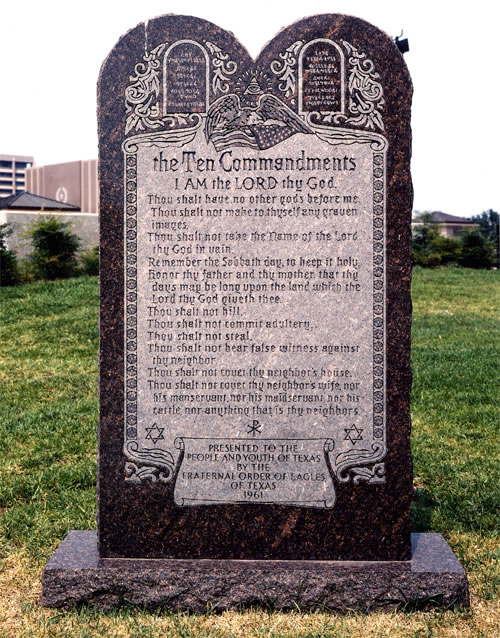
Furthermore, the New Testament says that Jesus has replaced
the Ten Commandments with new rules and has created a new covenant with the
people, thus making the Ten Commandments obsolete for Christians.
So this is the Biblical account of the Ten Commandments, but
what about how the Ten Commandments relate to American history and American
law?
The Common Origins of Western Law
One of the many justifications made by those in favor of
posting the Ten Commandments on public property is the claim that the Ten
Commandments are historically significant to American law. The Ten
Commandments were actually not given much consideration outside of Jewish
society until well after the adoption of Christianity by the Roman Empire,
and even then much more emphasis was placed on New Testament texts than Old
Testament ones by early Christians. By this time the basis of Western law
had already been established by the Greeks and Romans.
Before the oldest laws were recorded there were proverbs.
The earliest known written proverbs are those of the Sumerians,
written in cuneiform, the earliest known written language.
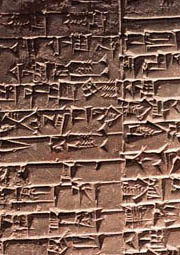
Sumerian Cuneiform Among these proverbs are several statements
similar to those found in the Ten Commandments, including statements such
as:
28-31: You should not steal anything; you should not
...... yourself. You should not break into a house; you should not wish
for the money chest;
35-38: You should not pick a quarrel; you should not
disgrace yourself. You should not spit out lies; ....... You should not
boast; then your words will be trusted.
50: You should not curse strongly.
The list of proverbs contains many more mundane and even
amusing statements as well.
Laws, unlike proverbs or commandments, provide a standard
for judgment as well as a defined punishment. The oldest known written laws
were recorded by the Sumerians as well, around 2095-2047 BCE.
The Sumerian Empire existed at the base of the Tigris and
Euphrates Rivers in the area of present day Iraq. The Sumerians were later
overtaken by the Babylonians and Assyrians, both of which derived their laws
from Sumerian law.
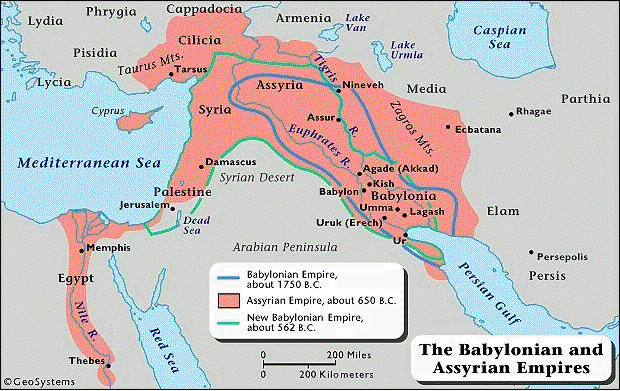
Around 1750 BCE the
Code of
Hammurabi was written in Babylon, based on the earlier Sumerian
laws. The Code of Hammurabi contains the first recorded use of "An Eye for an Eye and a Tooth for a
Tooth". There is significant debate about this law because though it sounds
"barbaric" today it may actually have been written with the intent of
limiting punishment to a measure no greater than the original offense. In
other words, the law prevented excessive punishment. The Code of Hammurabi
was posted all over the cities so that everyone could see it and no exceptions
were made to it, despite the fact that very few people could actually read.
A significant aspect of the Code of Hammurabi is that it was a secular set
of laws.
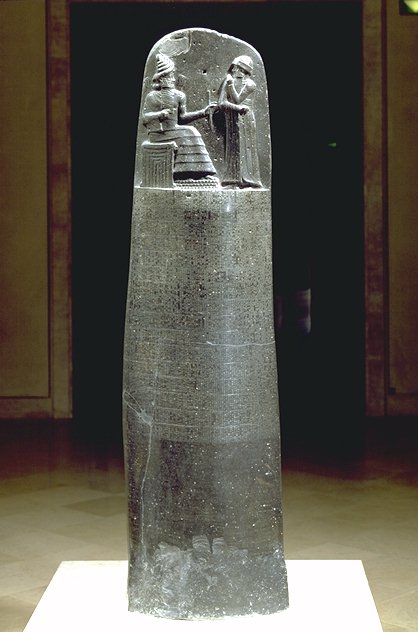
Code of Hammurabi
Egyptian law is actually thought to have proceeded the existence of
Sumerian law, but it appears that the Egyptian legal system didn't use
written laws and was not as well defined as Babylonian and Sumerian law. It is thought that Egyptian law
was not codified until after the Persians conquered Egypt around 525 BCE.
Prior to the codification of Egyptian law, however, the Egyptians did use a
system of legal precedent. Each case that was judged was recorded along with
its verdict. These precedents were referred back to in later cases, which
resulted in a legal system heavily based on tradition, with relatively
predictable outcomes for similar types of cases, but the laws weren't
clearly defined for the public.
The Egyptians are the first known people to have developed a strong
doctrine of social equality and impartiality before the law. This is perhaps
due to the great wealth of the region that afforded the kingdom the luxury
of fairness. Though laws were seen as coming from the authority of the
Pharaoh, the principle of Ma'at guided the law. The instruction for lawmaking to the Egyptian viziers was,
"the creator-god states that he has
made all men equal in opportunity and that, if there be any violation of
this equality, the fault is man's."
Religious commandments, also guided by Ma'at, were written down in Egypt prior to the
codification of civil law.
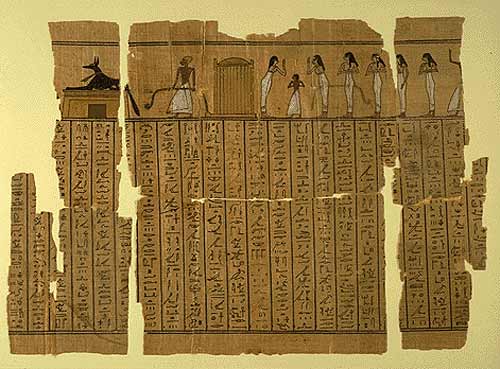
Section from a Book of the Dead
During the 18th Dynasty (between 1580-1350 BCE),
The Book
of Coming Into the Day, popularly known as The Book of the Dead,
was assembled from Egyptian texts and practices. One section of a book
recorded the 42 Confessions and 42 Judges that a person would have to pass
in order to successfully enter the eternal afterlife. The
42 Confessions are as follows:
1. I have not committed sin.
2. I have not committed robbery with violence.
3. I have not stolen.
4. I have not slain men and women.
5. I have not stolen grain.
6. I have not purloined offerings.
7. I have not stolen the property of God.
8. I have not uttered lies.
9. I have not carried away food.
10. I have not uttered curses.
11. I have not committed adultery, I have not lain with men.
12. I have made none to weep.
13. I have not eaten the heart.
14. I have not attacked any man.
15. I am not a man of deceit.
16. I have not stolen cultivated land.
17. I have not been an eavesdropper.
18. I have not slandered [no man].
19. I have not been angry without just cause.
20. I have not debauched the wife of any man.
21. I have not debauched the wife of [any] man.
22. I have not polluted myself.
23. I have terrorized none.
24. I have not transgressed [the law].
25. I have not been wroth.
27. I have not blasphemed.
28. I am not a man of violence.
29. I have not been a stirrer up of strife.
30. I have not acted with undue haste.
31. I have not pried into matters.
32. I have not multiplied my words in speaking.
33. I have wronged none, I have done no evil.
34. I have not worked witchcraft against the king.
35. I have never stopped [the flow of] water.
36. I have never raised my voice.
37. I have not cursed God.
38. I have not acted with arrogance.
39. I have not stolen the bread of the gods.
40. I have not carried away the khenfu cakes from the spirits of the
dead.
41. I have not snatched away the bread of the child, nor treated with
contempt the god of my city.
42. I have not slain the cattle belonging to the god.
It must have been very difficult to make it into the Egyptian afterlife,
but what this does represent is a clearly defined set of moral standards,
even though they were not laws.
According to scriptural tradition, after having lived in Babylon and Egypt for hundreds of years, some time around 1300
-1000 BCE the Hebrews established their own state outside of Egypt in
Israel. Hebrew texts, indeed the story of Moses and the Exodus, state that
the Hebrews worshiped many gods prior to leaving Egypt and didn't have their
own laws before they left. Clearly the story of Moses, regardless of its
accuracy, tells us that the Hebrews got at least some of their laws and their beliefs
from the Egyptians. The Hebrews had also previously lived in the lands of
the Sumerians, Assyrians and Babylonians. Modern archeology and scholarship,
however, casts serious doubt as to whether this early Israeli state ever
existed. Modern scholarship suggests that the Pentateuch (books of Moses)
were written between
700 BCE and 500 BCE, when a mythical Moses figure, along with a mythical
early kingdom, was invented.
According to the story of Moses, Moses was raised in Egypt by the
daughter of a Pharaoh and would have received the best of Egyptian
education. If the story is accepted at face value then indeed Moses himself
would have been greatly influenced by Egyptian law and knowledge. If the
story of Moses is taken as a mythology, similar to the story of Romulus and Remus or any number of other mythical founders of ancient civilizations,
then the story is still a reference to the Egyptian origins of Hebrew law.
What is remarkable about Hebrew law and the Hebrew texts is their indirect
preservation and continued use of so many of civilization's early laws.
Until the use of recent archeology, the Hebrew texts have provided the best
record of the laws of the Sumerians, Assyrians, Babylonians, Egyptians and
others, though is was not always acknowledged as such. The Hebrews did
develop their own unique laws as well, especially their ritual laws.
The
Hebrews later became subjects within the Roman Empire.
Civilization spread east and west from the Middle East through trade and
migration. In 621 BCE the first written code of Greek laws were set in stone by the
legislator
Dracon. Dracon didn't develop laws, what he did was codify the
exiting laws that had been passed down by oral tradition. The majority of
the laws were very harsh and often proscribed the death penalty for even
minor offences, which Dracon supported.
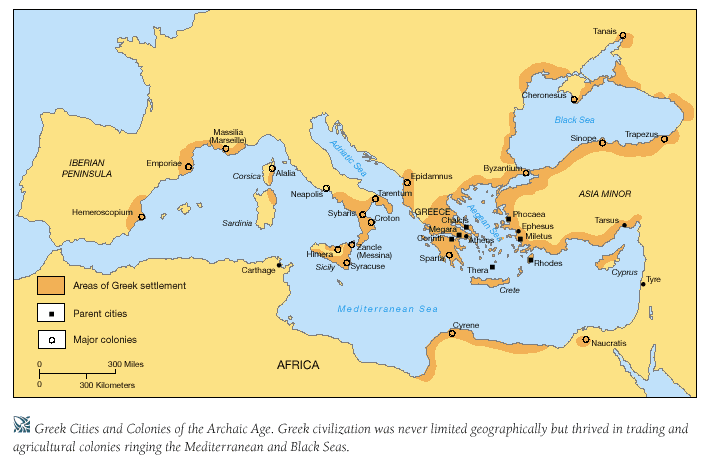
Solon
became archon of Greece in 594 BCE, and with this he began the task of
rewriting the laws of Athens. Solon, like many Athenians, was strongly
opposed to the injustices of the Draconian law. In addition to rewriting the
laws of Athens, to make them much more humane and fair, Solon relieved the
poor from their debts, introduced trial by jury, and wrote a new constitution for
Athens, known as the Solonian Constitution. The Solonian Constitution is
said to be the foundation for later Greek democracy.

Solon
Following this, Solon went into self-imposed exile in order
to prevent himself from becoming a dictator, and to see that his code of laws
could survive in his absence. During his exile he traveled to Egypt and
other civilizations studying law and history. While he was gone Athens
actually did revert back to tyranny, but the constitution ultimately
survived and paved the way for later democracy in Athens.
The Romans studied Greek Solonian law, and in 449 BCE the
Romans completed the first major codification of law for their city-state,
the Twelve Tables. The Twelve Tables represented a sort of Bill of Rights
for the Roman citizens. The writing of the Twelve Tables was commissioned by
the plebeians (commoners) so that the law could be known and would be
applied evenly, as opposed to the somewhat random and uneven application of
justice that had ruled Roman society up to that point.
From 336-326 BCE Alexander the Great of Macedonia united
many of the the Greek states and conquered the Persian Empire. The empire of
Alexander the Great resulted in a great cross-pollination of Greek, Egyptian
and Persian law. After his death, the legacy of his rule continued with the
Greek rule of Egypt during the Ptolemaic period, from 304 - 30 BCE.
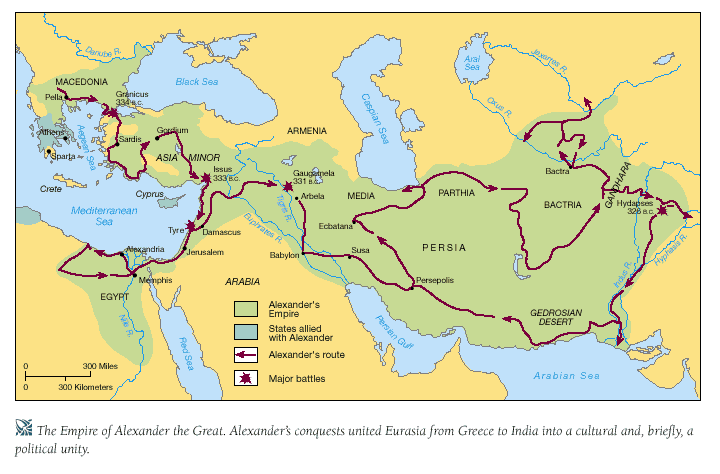
Rome existed as a republic from 509 BCE to 27 BCE. During
this time Roman law and the legal system were greatly advanced beyond the
development of the Twelve Tables. Roman law developed as a
science over this period, with professional judges and lawyers.
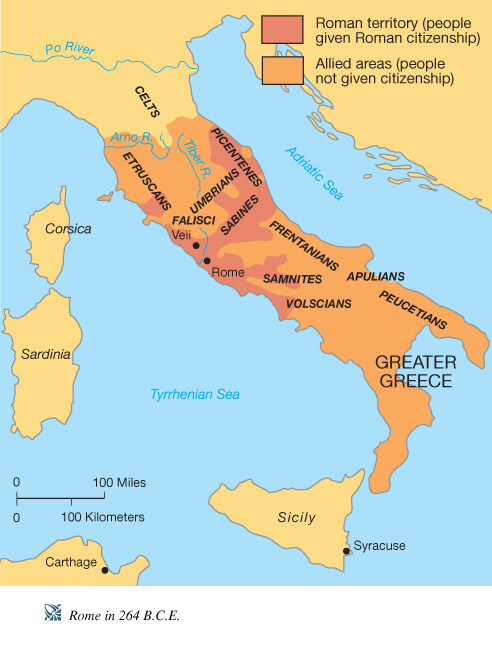
In 27 BCE Augustus Caesar was proclaimed Emperor of the
Roman Empire. The next 300 years are known as the Classical Period of Roman
law. Classical Roman law became the foundation of Western European law.
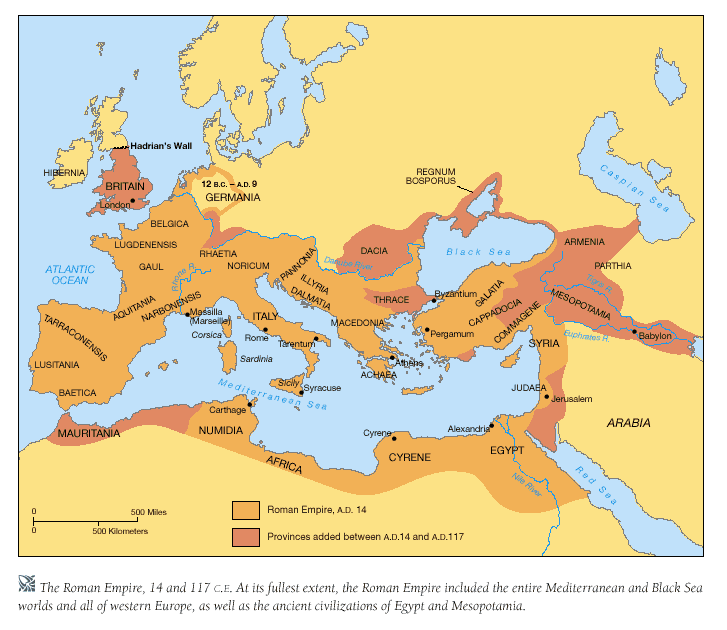
In the 4th century the Roman Emperor Theodosius declared
Christianity the official religion of the Roman Empire. By this time Rome
had devolved into a near complete dictatorship, with the powers of the
Senate having been almost completely eroded. The practice of Roman law
declined as well. Instead of courts being used as instruments of justice,
they became very politically involved and courts were used more as a way to
shape society to the will of the Emperor.
Less than 100 years after the adoption of Christianity by
the Emperor of Rome, the city of Rome was sacked and the decline of the
Roman Empire was under way.
By 450 CE the Romans had fully withdrawn from Britain.
In 533 CE the Justinian Institutes, or Code of Justinian,
was published by the Roman Emperor Justinian. The Justinian Code
stripped the rights of all persons who did not convert to Catholic
Christianity, and enacted harsh punishments against Jews and pagans. By the time of Justinian's rule, however,
almost all of the western part of the Roman Empire had been lost to the
so-called barbarians. The new capital of the Roman Empire was
Constantinople in the east in what is known as the Byzantine Empire. During Justinian's rule parts of the western
portion of the empire, such as Italy, were regained, but the bulk of Western
Europe was no longer under Roman control. Even the Justinian Institutes,
however, did not mention the Ten Commandments, and in fact was mostly an
attempt to re-codify traditional Roman law.
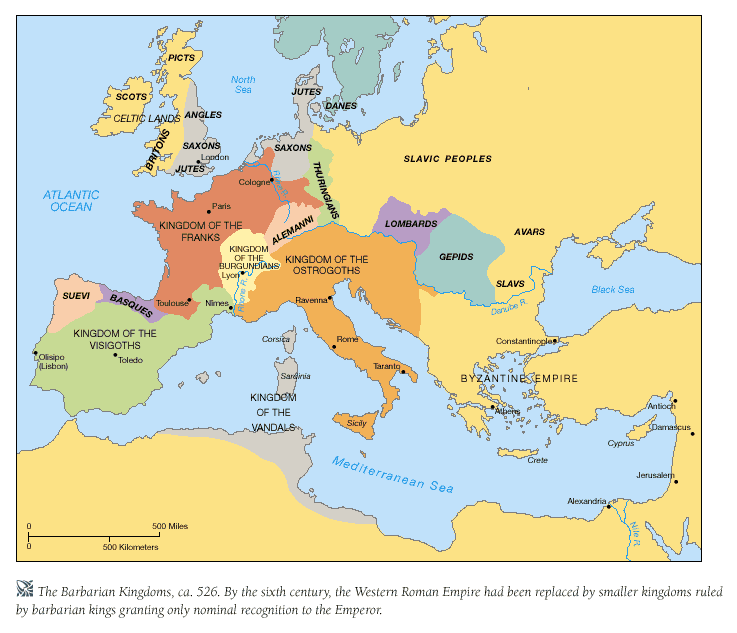
All of the civilizations and events mentioned thus far
contributed significantly to the base of law in Western Civilization.
Civilization and law developed in the Middle East and spread from there to
Greece and Rome. The Romanization of Europe then spread a relatively uniform
civilization and legal code throughout Western Europe. Of the places
conquered by Rome, however, Britain was perhaps least effected, in part
because of its isolation. English culture and English law stand apart from
the rest of Western Civilization as being less Roman and much more heavily
influenced by the local populations as well as by later invaders. This is
not to say that Britain wasn't Romanized, it was - just less so.
Anglo-Saxon and Norman Law
Because early American law is founded most heavily on
English law, the history of English law is important for understanding
American law.
Over time the Germanic tribes of the Angles, Jutes and
Saxons overtook the culture on the isle of Britain, and by 400 CE they
represented a significant force on the island as Roman influence waned
leading into what has traditionally been called the Dark Ages. The
"Anglo-Saxons" came from Germanic regions that had not been Romanized, and
thus when these tribes took over southeast Britain they brought with them
distinct elements of "pre-Roman" Germanic culture. The
Anglo-Saxons became the rulers of southeastern England and mixed with the
Romanized British population, though still retaining many elements of their
own tribal culture.
The English days of the week are an excellent example of the
blending of Anglo-Saxon and Roman culture. The days Sunday and Saturday come
from Roman origin with Sunday being the day of the worship of the sun-god
Helios and Saturday being the day of worship for the god Saturn (Cronus).
Monday, derives its name from "moon day", the day of the moon, which was
paired with the day of the sun.
The other days of the week are named after Anglo-Saxon gods: Tiw, the god of
war for Tuesday, Woden, the major god for Wednesday, Thor, the god of
thunder for Thursday, and Frige, the goddess of love for Friday.
The first Anglo-Saxon king (the word king comes from the
Saxon "kin", as kings were the rulers of tribes of kinsmen) was Ælle of Sussex
from 477 to about 514 CE. The Anglo-Saxons brought with them the concept of
individual rights and freedom. In Anglo-Saxon culture every individual had
rights. Not all people's rights were equal, nor were rights codified in law,
but it was cultural that all people had worth and that all people deserved
some measure of respect.
The
Anglo-Saxon codes of law were known as dooms. The first written code
of Anglo-Saxon law was The Laws of Æthelberht of Kent, written in 602 CE. The
Laws of Æthelbert deal almost exclusively with fines as reparation for
crimes. A few examples are listed below.
10. If a man lie with the king's maiden, let him pay a bot
(restitution)
of fifty shillings.
13. If a man slay another in an eorl's tun, let him
make bot with twelve shillings.
16. If a man lie with a ceorl's birele, let him make
bot with six shillings; with a slave of the second (class), fifty
scaetts; with one of the third, thirty scaetts.
18. If a man furnish weapons to another where there is strife,
though no evil be done, let him make bot with six shillings.
21. If a man slay another, let him make bot with a half
leodgeld of 100 shillings. . . .
31. If a freeman lie with a freeman's wife, let him pay for it
with his wergeld, and provide another wife with his own money,
and bring her to the other.
More dooms were written and codified by Anglo-Saxon kings over the years. As
the Anglo-Saxons became Christianized the number of religious laws increased
and the number of laws regarding the rights and land ownership of the
churches increased as well. Some laws came to be written by clerics, and thus
many laws greatly favored the Church, granting extensive properties to
the Church and were favorable to the clergy with greater punishments for
crimes against the clergy.
Another form of law that developed during this time is known as common
law. Common law was law that was created through the process of judgment on
cases. As cases were judged by courts the rulings set precedents that
became the common law. Common law, like the other laws, varied widely in
Anglo-Saxon England from region to region.
Basically, Anglo-Saxon law embodied the culture and values of the pagan
Germanic tribes, but wrapped in the structure of Roman institutions and,
eventually, in the language of Christianity as well.
The last Anglo-Saxon king was Edgar Ætheling, who ruled briefly in the
year 1066 before submitting to William the Conqueror of Normandy.
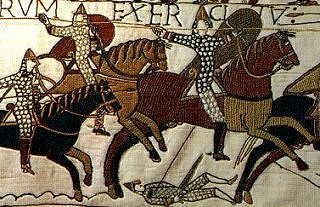
The Norman Conquest of England was a major turning point in English
civilization and English law. The Normans, from France, "re-Romanized" England and brought
to it the advanced civilization that existed on mainland Europe. Much
of the present day American legal system has its roots in the legal system
of the Norman Administrators.
The Normans introduced a centralized court system and were the first to
use trial by a jury of peers in England.
Overall, however, the Normans incorporated a lot of the existing legal
system. The local courts continued to function under the Normans and the
Norman laws were based on the existing Anglo-Saxon laws.
The big change made by the Normans was the consolidation and codification of common law.
Under the Anglo-Saxons each region had its own law. There was a court
hierarchy that consisted of local courts, courts of the Shire, and
ultimately the King's court, called the Witan. The King's court, however,
moved around the country and heard cases in their local communities based on
the local laws.
The Normans ended this system of regional laws and a traveling high
court and replaced it with a stationary "supreme court" with a single
code of law that was applied equally across the kingdom. They also replaced the
practice of using untrained freemen to judge cases with the use of trained
professional judges.
While the Anglo-Saxon concept of individual rights had existed in England
for
hundreds of years, it wasn't until the Normans put the Anglo-Saxon freedoms
to the test that individual rights were
codified in a constitutional document. It was the
Magna
Carta, written in 1215 in order to end the abuses of King John, that
first put the rights of serfs, the aristocracy, and the King on paper.
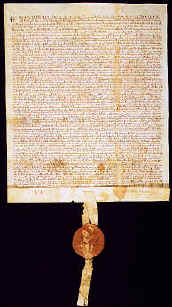
Magna Carta
King John failed to honor many of the traditional customs and rights of
his subjects, and thus in 1215 he was forced by a group of nobles to sign
the Magna Carta, which is a written statement that defined the rights of the
governed and of the government. While not a true constitution, the Magna Carta is seen as the basis for English constitutional law, and a model for
the American Constitution.
Another major legal advance was made in 1215 as well, and
this was the outlawing of trial by ordeal. All across Europe priests had
used trial by ordeal for centuries as a means to "let God be the judge."
An essential quality of a justice system is for it to be impartial , and in order to be impartial it has to have an impartial judge. For this reason trials
were seen in the post-Roman time as being judged by God in one of three
ways: either by "oaths", "ordeal", or "battle". Trial by oath involved the
use of judges whose role was simply to detect if someone broke an oath.
When it was not possible to reach a verdict in a trial by oath, or if there
were no other witnesses to call to cross testify, then trial by ordeal or
battle would be used. In more significant cases trial by oath may have been skipped
and the case may have gone straight to trial by ordeal.
Trial by ordeal was essentially a game of chance played with
a person's life. The basis for this type of trial was found by priests in
the Bible.
Acts 1: 23So they proposed two men: Joseph
called Barsabbas (also known as Justus) and Matthias. 24Then
they prayed, "Lord, you know everyone's heart. Show us which of these
two you have chosen 25to take over this apostolic ministry,
which Judas left to go where he belongs." 26Then they cast
lots, and the lot fell to Matthias; so he was added to the eleven
apostles.
Passages such as this supported the view that God
would act as judge and that God would indicate his judgments through acts
of chance.
In 1215 the Lateran Council of the Roman Catholic Church
finally outlawed the use of trial by ordeal among priests, and this opened
the way for the development and adoption of trial by jury in secular courts.
Over the next few hundred years of feudalism England
suffered through the Hundred Years War with France, the Black Plague, and
the War of the Roses, while political infighting waged among the nobility.
In 1509 King Henry VIII came to power. In 1522 King Henry
VIII denounced the Protestant reformer Martin Luther and defended the
Catholic Church with his publication of Defense of the Seven Sacraments.
This was highly unpopular in England because there was widespread
discontent with the Catholic Church among the public. Indeed, the people of
England had long despised the Catholic Church because it was associated with
the Norman invasion and it was recognized as an institution of foreign interference in
domestic affairs. In addition to these things, Catholicism was heavily
associated with the Irish, whom the English and Welsh saw as uncivilized.
Of all of the nations of Western Europe, England was perhaps
the most anti-Catholic.
King Henry VIII went on to lead major reforms and eventually engineered
the English split from the Catholic Church. In 1533 King Henry VIII was
excommunicated from the Catholic Church. Later that year he passed the
Buggery Act of 1533, the first anti-sodomy law in England's history, which
made sodomy and bestiality punishable by death. This may have been partly related
to a Celtic ritual in practice at the time for the initiation of kings,
whereby new kings would have sex with a white mare in public ceremonies.
In 1534 King Henry VIII passed the Act of Supremacy, which
formalized the split between the English Crown and the Catholic Church.
Under the Act of Supremacy pledging allegiance to any church other than the
Church of England, or to any non-Episcopalian religious leader, was
considered treason and was punishable by death.

In 1542 The Witchcraft Act was passed, which made the
practice of "witchcraft" or any other form of "sorcery" punishable by death.
In 1603 King James asserted the divine right of kings.
James wrote:
The state of monarchy is the supremest thing upon earth;
for kings are not only God's lieutenants upon earth, and sit upon God's
throne, but even by God himself are called gods. There be three
principal similitudes that illustrate the state of monarchy: one taken
out of the word of God; and the two other out of the grounds of policy
and philosophy. In the Scriptures kings are called gods, and so their
power after a certain relation compared to the divine power. Kings are
also compared to fathers of families: for a king is truly Parens
patriæ, the politique father of his people. And lastly, kings are
compared to the head of this microcosm of the body of man.
King James commissioned an "official" English version of
the Bible for the Church of England, and in 1611 the King James Bible went
into publication. It was in the Bible that King James found
support for the divine right of kings. Not only did the Old Testament give
many examples of God giving authority to the kings of Israel, but the New
Testament endorses divine authority as well.
(King James Version)Romans 13:
1Let every soul be subject
unto the higher powers. For there is no power but of God: the powers
that be are ordained of God.
2Whosoever therefore resisteth the
power, resisteth the ordinance of God: and they that resist shall
receive to themselves damnation.
3For rulers are not a terror to good
works, but to the evil. Wilt thou then not be afraid of the power? do
that which is good, and thou shalt have praise of the same:
4For he is the minister of God to
thee for good. But if thou do that which is evil, be afraid; for he
beareth not the sword in vain: for he is the minister of God, a revenger
to execute wrath upon him that doeth evil.
5Wherefore ye must needs be subject,
not only for wrath, but also for conscience sake.
6For for this cause pay ye tribute
also: for they are God's ministers, attending continually upon this very
thing.
7Render therefore to all their dues:
tribute to whom tribute is due; custom to whom custom; fear to whom
fear; honour to whom honour.
Colonial American Law
By this time, of course, the first English colonies had been established
in America. Jamestown, named after King James, was successfully
established in 1607.
One of the major problems with trying to claim "a" central American
cultural or legal heritage based on the English colonies is that the culture
and law of every English colony was different, in some cases radically
different and downright in opposition to one another. The common point
among the English colonies was their common inheritance of English law.
Some of the early English colonies were formed by religious groups such
as the Pilgrims and Puritans, and others were formed by slave traders and
profit seekers. The colonies were populated by everyone from outlaws,
to merchants, to people trying to escape debt, to those seeking freedom from religious persecution, to others
who were simply adventurers that came to America for excitement and not for
political, economic or religious reasons.
In general, the New England area was the most religious area. The Middle
Colonies were the most tolerant and enlightened area, as well as the area
that concentrated the most on mercantile activity and the farming of food
crops. The Southern Colonies were used as penal colonies to dump English
prisoners and were also highly involved in the use of African slaves to farm
cash crops such as tobacco. The areas west of the coast were populated by
frontiersmen who typically had little concern for civilization, some of
which "went native" and interacted more with the Native Americans than their
European counterparts.
In 1620 the Mayflower set sail for Virginia. Along the way differences of
opinion arose between passengers on the ship. Some of the passengers were
setting sail for America for religious reasons, and others for commercial
reasons. The more commercially interested passengers, who were members of
the Church of England and followers of King James, were displeased with
the Pilgrims and wanted to leave to form their own colony once the ship
landed. The problem for the Pilgrims, however, was that many of the
Anglicans possessed essential survival skills that the Pilgrims didn't have.
Thus, in order to increase the likelihood of survival, the Mayflower Compact
was signed to ensure that the two groups would live and work together. The
Mayflower Compact reads as follows:
In the name of God, Amen. We, whose names are underwritten, the loyal
subjects of our dread sovereigne Lord, King James, by the grace of God,
of Great Britaine, France, and Ireland king, defender of the faith,
etc., having undertaken, for the glory of God and the advancement of the
Christian faith, and honour of our king and country, a voyage to plant
the first colony in the Northerne parts of Virginia, doe, by these
presents, solemnly and mutually in the presence of God, and one of
another, covenant and combine ourselves together into a civil body
politick, for our better ordering and preservation and furtherance of
the ends aforesaid; and by virtue hereof to enacte, constitute, and
frame such just and equall laws, ordinances, acts, constitutions, and
offices, from time to time as shall be thought most meete and convenient
for the generall good of the Colonie unto which we promise all due
submission and obedience. In witness whereof we have hereunder
subscribed our names at Cap-Codd the II. of November, in the year of the
reign of our sovereigne lord, King James of England, France, and
Ireland, the eighteenth, and of Scotland the fiftie-fourth. Anno. Dom.
1620.
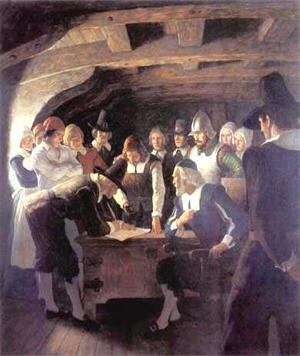
Signing of Mayflower compact, showing both pious and non-pious participants
The wording of the contract was standard for its time.
Shortly after, in 1630, John Winthrop led a fleet carrying
700 Englishmen to the Massachusetts Bay Colony as part of a deeply
religious Puritanical movement. Winthrop, who was elected governor of
Massachusetts, claimed that the Puritans were the new Israelites, bound for
the New World to create a new Christian "City on a Hill" as a shining
example for all the world to follow.
The colony established by John Winthrop was arguably the
most religiously devoted community in all of American colonial and
post-colonial history. The Puritans following John Winthrop favored Biblical
law and even the practice of veiling women.
In 1641
The
Massachusetts Body of Liberties was drafted, listing the laws of
Massachusetts. The Puritans were not only heavily religious, but they also
placed much more importance than most Christians on the Old Testament.
Indeed, Mosaic law was cited in the 1641 legal code, yet even in this
document the Ten Commandments are not cited, with the exception of the first
commandment. The section on capital crimes reads as follows (Note: "s" was written
with a letter similar to our "f")
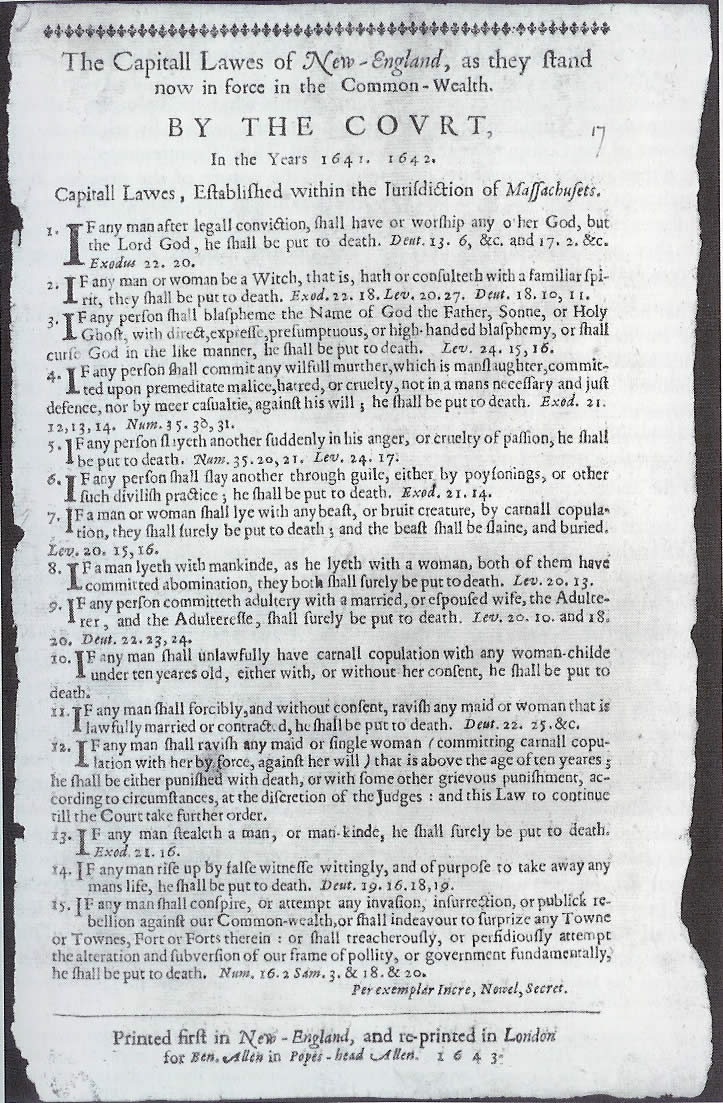
Between 1659 and 1661 four Quakers were hanged, and many more imprisoned
or tortured, for preaching views that contradicted Puritan teachings.
Not long after, in 1692, the infamous Witchcraft Trials
began in Salem, Massachusetts. In all 25 people were killed for suspicion
of being witches, 19 of which were hanged, one elderly man was crushed by
stones, and the others died from languishing in prison. 160 people were
accused altogether, many of which were jailed, ostracized, or had their
property confiscated from them.
For the most part, however, the colonies were actually governed by
the laws of England, which themselves were highly intolerant on matters of
religion. Every colony was governed differently, and the status
of most colonies changed several times between their initial formation and
the American Revolution. The only colonies to actually remain independent of
the English Crown from their inception until the Revolution were the colonies of Connecticut
and Rhode Island.
Rhode Island was especially known as a refuge for people
fleeing from religious persecution in Massachusetts. For that reason Rhode Island was the most religiously tolerant of the New England colonies, and
the only colony with an open Jewish community.
The biggest difference between American colonial law and
English law was in regard to slavery. In America, unlike any of the
other places practicing slavery at that time, slaves actually came
to be defined as property. In 1705 Virginia passed the
first
such law to define slaves as property:
All servants imported and brought into the Country...who
were not Christians in their native Country...shall be accounted and be
slaves. All Negro, mulatto and Indian slaves within this
dominion...shall be held to be real estate. If any slave resist his
master...correcting such slave, and shall happen to be killed in such
correction...the master shall be free of all punishment...as if such
accident never happened.
This law, and others like it throughout the South, made it
legal for Christians to enslave and kill other humans, as long as the other
humans were not Christians.
Back in England
A lot was going on back in England during the period of
American colonialism: wars, power struggles, the overthrowing of the
government, industrialization, and more. In 1628
The Petition of Right was presented to King Charles I of England,
which pleadingly called for an end to government abuses of power.
After the overthrow of the King, a religiously fueled
civil war, the rule of Oliver Cromwell, and the restoration of The Crown,
King James II passed the
Declaration of Indulgence in 1687, which granted full religious
freedom to the citizens of England. The declaration:
- suspended all penal laws in matters ecclesiastical for not
attending the established Church of England or not receiving
communion according to its rites;
- permitted people to worship other than in the established Church
of England either in private houses or in chapels;
- ended the requirement that people take various religious oaths
before advancement to civil or military office.
The declaration applied to Catholics, Protestants, Unitarians, Jews,
Muslims, and people of any or even no faith.
The law didn't last long though, because in 1689 Mary II (a
Protestant) overthrew King James II (a Catholic) to become Queen and she
immediately voided the Declaration of Indulgence.
Queen Mary II and William III did, however, sign an English
Bill of Rights before they were confirmed as rulers of England.
The English Bill of Rights, while not as powerful or
as encompassing as the later American Bill of Rights, was nevertheless a
predecessor to the American document. The English Bill of Rights stated the
following:
Englishmen, as embodied by Parliament, possessed certain civil and
political rights that could not be taken away. These included:
- freedom from royal interference with the law (the Sovereign was
forbidden to establish his own courts or to act as a judge himself)
- freedom from taxation by royal prerogative, without agreement by
Parliament
- freedom to petition the king
- freedom from a peace-time standing army, without agreement by
Parliament
- freedom (for Protestants only) to bear arms for self-defense, as
allowed by law
- freedom to elect members of Parliament without interference from
the Sovereign
- the freedom of speech in Parliament, in that proceedings in
Parliament were not to be questioned in the courts or in any body
outside Parliament itself (the basis of modern parliamentary
privilege)
- freedom from cruel and unusual punishments, and excessive bail
- freedom from fines and forfeitures without trial
In 1690 the famous English thinker John Locke published
The Second Treatise of Civil Government. This was a highly
influential work that was widely read by many of the American founders.
Locke argued against the divine right of kings and proposed a system of
limited government with checks and balances. The closing paragraph of his
works reveals the concepts that would later be implemented in the United
States Constitution:
To conclude, The power that every individual gave
the society, when he entered into it, can never revert to the
individuals again, as long as the society lasts, but will always remain
in the community; because without this there can be no community, no
common-wealth, which is contrary to the original agreement: so also when
the society hath placed the legislative in any assembly of men, to
continue in them and their successors, with direction and authority for
providing such successors, the legislative can never revert to the
people whilst that government lasts; because having provided a
legislative with power to continue for ever, they have given up their
political power to the legislative, and cannot resume it. But if they
have set limits to the duration of their legislative, and made this
supreme power in any person, or assembly, only temporary; or else, when
by the miscarriages of those in authority, it is forfeited; upon the
forfeiture, or at the determination of the time set, it reverts to the
society, and the people have a right to act as supreme, and continue the
legislative in themselves; or erect a new form, or under the old form
place it in new hands, as they think good.
In 1765 another influential text,
Commentaries on the Laws of England, was published by Sir William
Blackstone. This set of books, four in all, was very popular among lawyers
and laymen with legal interests. The book was also widely circulated in
America. The Blackstone work is a historical assay of English law, along
with commentary on the current law of the day.
Blackstone, like many of his time, took a highly spiritual
view of law, but this view, also common for the time, was highly
deistic and "rational". Blackstone defined "God's Law" as the "Laws of
Nature", not as any religious set of instructions.
MAN, considered as a creature, must necessarily be subject to
the laws of his creator, for he is entirely a dependent being. A being,
independent of any other, has no rule to pursue, but such as he prescribes
to himself; but a state of dependence will inevitably oblige the inferior to
take the will of him, on whom he depends, as the rule of his conduct: not
indeed in every particular, but in all those points wherein his dependence
conflicts. This principle therefore has more or less extent and effect, in
proportion as the superiority of the one and the dependence of the other is
greater or less, absolute or limited. And consequently as man depends
absolutely upon his maker for every thing, it is necessary that he should in
all points conform to his maker's will.
THIS will of his maker is called the law of nature. For as God, when he
created matter, and imbued it with a principle of mobility, established
certain rules for the perpetual direction of that motion; so, when he
created man, and imbued him with freewill to conduct himself in all parts of
life, he laid down certain immutable laws of human nature, whereby that freewill is in
some
degree regulated and restrained, and gave him also the faculty of reason to
discover the purport of those laws.
...
THIS law of nature, being co-eval with mankind and dictated by God
himself, is of course superior in obligation to any other. It is binding
over all the globe, in all countries, and at all times: no human laws
are of any validity, if contrary to this; and such of them as are valid
derive all their force, and all their authority, mediately or
immediately, from this original.
The most significant contribution of Blackstone's books,
however, was not his own interpretation of legal theory, but his historical
documentation of English law, still considered one of the most comprehensive
ever assembled. Nowhere in all four of Blackstone's volumes are the Ten
Commandments mentioned. Blackstone did make mention a few times of Mosaic
law, but these are generally in references to Jews.
One example is in Blackstone's discussion of laws governing
rape:
A THIRD offence, against the female part also of his
majesty's subjects, but attended with greater aggravations than that of
forcible marriage, is the crime of rape, raptus mulierum, or the carnal
knowledge of a woman forcibly and against her will. This, by the Jewish
law, was punished with death, in case the damsel was betrothed to
another man; and, in case she was not betrothed, then a heavy fine of
fifty shekels was to be paid to the damsel's father, and she was to be
the wife of the ravisher all the days of his life; without that power of
divorce, which was in general permitted by the mosaic law.
THE civil law [of Rome] punishes the crime of ravishment with death and
confiscation of goods: under which it includes both the offence of
forcible abduction, or taking away a woman from her friends, of which we
last spoke; and also the present offence of forcibly dishonoring them;
either of which, without the other, is in that law, sufficient to
constitute a capital crime. Also the stealing away a woman from her
parents or guardians, and debauching her, is equally penal by the
emperor's edict, whether she consent or is forced: “five volentibus,
five nolentibus mulieribus, tale facinus fuerit perpetratum.” And this,
in order to take away from women every opportunity of offending in this
way; whom the Roman laws suppose never to go astray, without the
seduction and arts of the other sex: and therefore, by restraining and
making so highly penal the solicitations of the men, they meant to
secure effectually the honor of the women...
But our English law does not entertain quite such sublime ideas of the
honor of either sex, as to lay the blame of a mutual fault upon one of
the transgressors only: and therefore makes it a necessary ingredient in
the crime of rape, that it must be against the woman's will.
RAPE was punished by the Saxon laws, particularly those of king
Athelftan, with death: which was also agreeable to the old Gothic or
Scandinavian constitutions. But this was afterwards thought too hard:
and in it's stead another severe, but not capital, punishment was
inflicted by William the conqueror; viz. castration and loss of eyes;
which continued till after Bracton wrote, in the reign of Henry the
third.
All in all Blackstone mentioned Moses or Mosaic law only
four times throughout all four volumes of this work. Perhaps the one
statement that gives the most recognition to Mosaic law is the following
statement, where he discusses the origins of diversity in English law:
... this uncertainty of the true origin of particular
customs must also in part have arisen from the means, whereby
christianity was propagated among our Saxon ancestors in this island; by
learned foreigners brought over from Rome and other countries: who
undoubtedly carried with them many of their own national customs; and
probably prevailed upon the state to abrogate such usages as were inconsistent
with our holy religion, and to introduce many others that were more
conformable thereto. And this perhaps may have partly been the cause,
that we find not only some rules of the mosaical, but also of the
imperial and pontifical laws, blended and adopted into our own system.
A FARTHER reason may also be given for the great variety, and of course
the uncertain original, of our ancient established customs; even after
the Saxon government was firmly established in this island: viz. the
subdivision of the kingdom into an heptarchy, consisting of seven
independent kingdoms, peopled and governed by different clans and
colonies. This must necessarily create an infinite diversity of laws:
even though all those colonies, of Jutes, Angles, proper Saxons, and the
like, originally sprung from the same mother country, the great northern
hive; which poured forth it's warlike progeny, and swarmed all over
Europe, in the sixth and seventh centuries. This multiplicity of laws
will necessarily be the case in some degree, where any kingdom is
cantoned out into provincial establishments; and not under one common
dispensation of laws, though under the same sovereign power.
In any case, Blackstone's Commentaries, the most
thorough examination of English law at that time, made little mention of
Mosaic law and no mention of the Ten Commandments, while spending much time
on the discussion of Anglo-Saxon, Roman, and Norman law, with a moderate
discussion of Greek law.
The Founding Fathers and the Constitution
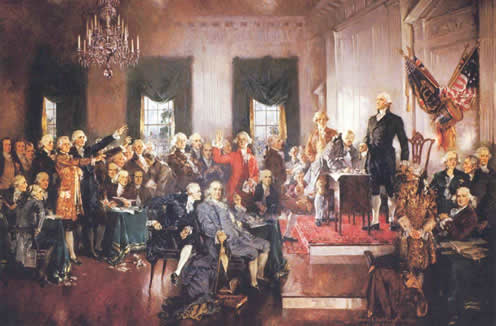
As has been mentioned earlier, the biggest problem with
trying to define an American legal or ideological heritage is that there was
an enormous degree of legal and ideological diversity among the colonists.
The inhabitants of America, at the time of The Revolution, represented the
widest array of extremes that existed in England. American colonists were
largely the people who were too extreme in some fashion to cohabitate with
their peers in their homeland, or were unsatisfied with life there.
Behaviors and beliefs that were not acceptable in England were engaged in in
America.
In America there existed the most extreme form of slavery,
the most extreme form of religious tyranny, as well as the most extreme form of
religious tolerance. What allowed all of these people to co-exist in the
American colonies was space - the fact that there was so much land in America
that all the very different groups were able to spread out and form their
own little communities away from others that were not like them.
This is also why there was a large degree of distrust of and
opposition to a strong federal government.
The number of founders
varies depending on who you ask, and how "founder" is defined. Under the most
broad definition there are about 104 American Founders, including the
signers of the Declaration of Independence, the Constitution, and a small
list of other critically influential individuals.
Among this group alone there was significant ideological
disagreement. The most famous disagreement was between Thomas Jefferson and
Alexander Hamilton, who took different views on the nature of government
and the value of democracy. Indeed, some of the founders were afraid of
democracy. Democracy was actually a "dirty word" at the time of the founding
of the United States, almost like anarchy. Some of the founders expressed
fear of "mob rule", which is why importance was placed on a
republican system.
Jefferson, however, was the staunchest supporter of
democracy and played a pivotal role in securing and broadening democratic
principles during his presidency.
What is clear, however, is that the Founding Fathers as a
whole had
very little in common with the early Pilgrims and Puritans. First of all,
both the Pilgrims and Puritans made the professional practice of law illegal.
Both of these highly religious groups had been persecuted under the law
in England and for other religious reasons they believed that practicing law
for profit was immoral and despicable.
Therefore, there were no professional lawyers among the
Puritans and Pilgrims, they generally represented themselves in legal
cases.
The Founders, on the other hand, were almost all professional lawyers
and were not highly thought of by many of the ultra-religious sects
in America. Indeed some preachers gave sermons denouncing the Founders as
heathens and claiming that the Founders were usurpers of power for even
creating a federal government at all. As much as people today look back at
the original formation of the country and see it as one with a limited
federal government, at the time many people thought that the federal
government was far too strong.
These views were expressed most clearly in the
Anti-Federalist Papers, a collection of newspaper writings by anonymous men
who wrote in opposition to the arguments in favor of the Constitution, which
were being put forward by the Federalists. The majority of the Federalist
writings were written by Alexander Hamilton and James Madison.
Therefore, looking back at the origins of "American law" is
not a straight forward or simple task, and it is common for some people to
incorrectly associate laws, practices, and beliefs of non-founders with the
Founders. A very common mistake in understanding "American law" is to view
the colonial law of the early states as compatible with the constitutional law
that was set forward by the Founders.
In fact, the constitutional law framed by the Founders was
often in direct conflict with existing state laws.
In
Introduction to the Constitutional Convention, Gordon Lloyd writes:
Others, especially James Madison, were concerned that the state
legislatures—dominated by what he saw as oppressive, unjust, and overbearing
majorities—were passing laws detrimental to the rights of individual
conscience and the right to private property. And there was nothing that the
union government could do about it because the Articles left matters of
religion and commerce to the states. The solution, concluded Madison, was to
create an extended republic, in which a variety of opinions, passions, and
interests would check and balance each other, supported by a governmental
framework that endorsed a separation of powers between the branches of the
general government.
One such example of a statement from James Madison is as
follows:
Nothwithstanding the
general progress made within the two last centuries in favour of this
branch of liberty, & the full establishment of it, in some parts
of our Country, there remains in others a strong bias towards the old
error, that without some sort of alliance or coalition between Gov'
& Religion neither can be duly supported: Such indeed is the
tendency to such a coalition, and such its corrupting influence on
both the parties, that the danger cannot be too carefully guarded agst..
And in a Gov' of opinion, like ours, the only effectual guard must be
found in the soundness and stability of the general opinion on the
subject. Every new & successful example therefore of a perfect
separation between ecclesiastical and civil matters, is of importance.
And I have no doubt that every new example, will succeed, as every
past one has done, in shewing that religion & Gov will both exist
in greater purity, the less they are mixed together;
- President James Madison 1822
Clearly significant differences of opinion were acknowledged to exist
within
the country.
The Founders were among the most highly educated and well
read men of the Americas. They were also among the wealthiest men of North
America. These are men who studied the ancient classics and many knew several
languages including Greek and Latin. They studied the legal codes and
government structures of ancient Greece, Rome and even China.
Among the Founders, John Adams, Thomas Jefferson, Alexander
Hamilton, James Madison, George Washington and Benjamin Franklin are
generally considered to be the most important.
John Adams was, of course, a lawyer. As a law student John
Adams put extensive effort into the study of Roman law. This was due in part
to the fact that Roman law is the basis of civil law and Roman law was also the most
common root of all European law, thus Roman law was important for dealing with foreign merchants, such as the Dutch, French and Spanish.
Jeremiah Gridley, John Adams' personal tutor, is said to have told Adams that
classical texts "ought to be the study of our whole lives."
In Adams' diary he noted:
29 Sunday. Oct. 5th, 1758
...
It is low to admire a Dutch Commentator merely because
he uses latin and greek Phraseology. Let me be able to draw the True
Character both of the Text of Justinian, and of the Notes of his
Commentator, when I have finished the Book. Few of my Contemporary
Beginners, in the Study of Law, have the Resolution, to aim at much
Knowledge in Civil Law. Let me therefore distinguish myself from them,
by the Study of the Civil Law, in its native languages, those of Greece
and Rome.
Indeed Adams was an astute student of both law and history.
In 1788 Adams published
A
Defence of the Constitutions of the United States of America. The
book's Table of Contents reads as follows:
I. Preliminary Observations 3
DEMOCRATICAL REPUBLICS.
III. St. Marino 8
IV. Biscay 16
The Grisons 21
The United Provinces of the Low Countries 22
V. Switzerland 22
Appenzel 23
VI. Underwald 26
VII. Glaris 28
VIII. Zug 31
IX. Uri 32
X. Switz 34
ARISTOCRATICAL REPUBLICS.
XI. Berne 35
XII. Fribourg 39
XIII. Soleure 42
XIV. Lucerne 45
XV. Zurich 47
XVI. Schaffhause 49
Mulhouse - Bienne 50
XVII. St. Gall 51
Geneva 52
XVIII. Lucca - Genoa 56
XIX. Venice 58
The United Provinces of the Low Countries 69
MONARCHICAL REPUBLICS.
XX. England 70
XXI. Poland 72
XXII. Poland 74
XXIII. Recapitulation 91
PHILOSOPHERS.
XXIV. Dr. Swift 97
XXV. Dr. Franklin 105
XXVI. Dr. Price 121
MIXED GOVERNMENTS.
XXVII. Machiavel 141
XXVIII. Sidney 148
Montesquieu 153
ANCIENT REPUBLICS, AND OPINIONS OF PHILOSOPHERS.
XXIX. Harrington 158
XXX. Polybius 169
XXXI. Polybius 177
XXXII. Dionysius Halicarnassensis - Valerius 184
XXXIII. Plato 188
XXXIV. Sir Thomas Smith 207
ANCIENT DEMOCRATICAL REPUBLICS.
XXXV. Carthage 210
ANCIENT ARISTOCRATICAL REPUBLICS.
XXXVI. Rome 215
ANCIENT MONARCHICAL REPUBLICS.
XXXVII. Tacitus 225
XXXVIII. Homer - Phæacia 232
XXXIX. Homer - Ithaca 237
Homer 242
ANCIENT ARISTOCRATICAL REPUBLICS.
XL. Lacedæmon 249
ANCIENT DEMOCRATICAL REPUBLICS.
XLI. Athens 260
XLII. Antalcidas 286
XLIII. Achaia 295
XLIV. Crete 305
XLV. Corinth 308
XLVI. Argos 311
XLVII. Iphitus 315
XLVIII. Thebes 318
ANCIENT ARISTOCRATICAL REPUBLICS.
XLIX. Crotona - Pythagoras 322
ANCIENT DEMOCRATICAL REPUBLICS.
L. Sybaris - Charondas 327
LI. Locris - Zaleucus 331
LII. Rome 334
CONCLUSION.
LIII. Congress 362
LIV. Locke, Milton, and Hume 365
LV. Conclusion 372
Postscript 383
It is clear that Adams drew lessons from many different
civilizations, and saw the Constitution of the United States as being
influenced by these many different examples of government in the past. The
book contained both writings written for the book and reprintings of letters
that Adams had written in the past. In one such letter Adams stated:
To collect together the ancient and modern leagues — the
Amphictyonic, the Olynthian, the Argive, the Arcadian, and the Achæan
confederacies, among the Greeks — the general diet of the Swiss cantons, and
the states general of the United Netherlands — the union of the hanse-towns,
&c. which have been found to answer the purposes both of government and
liberty; to compare them all, with the circumstances, the situation, the
geography, the commerce, the population, and the forms of government, as
well as the climate, the soil, and manners of the people, and consider what
further federal powers are wanted, and may be safely given, would be a
useful work.
Adams' defense of the Constitution consists firmly of lessons
drawn from history. Nowhere in the volume did Adams make an appeal to divinity
or the Bible. In fact, the Bible is not even mentioned one time in the work and
Adams stated, "it will forever be acknowledged that these governments were
contrived merely by the use of reason and the senses."
In the Preface to the work Adams wrote:
Commerce begins to thrive: and if religious toleration were
established, and personal liberty a little more protected, by giving an
absolute right to demand a public trial in a certain reasonable time — and
the states invested with a few more privileges, or rather restored to some
that have been taken away — these governments would be brought to as great a
degree of perfection, they would approach as near to the character of
governments of laws and not of men, as their nature will probably admit of.
In so general a refinement, or more properly reformation of manners and
improvement in knowledge, is it not unaccountable that the knowledge of the
principles and construction of free governments, in which the happiness of
life, and even the further progress of improvement in education and society,
in knowledge and virtue, are so deeply interested, should have remained at a
full stand for two or three thousand years? — According to a story in
Herodotus, the nature of monarchy, aristocracy, and democracy, and the
advantages and inconveniences of each, were as well understood at the time
of the neighing of the horse of Darius, as they are at this hour. A variety
of mixtures of these simple species were conceived and attempted, with
different success, by the Greeks and Romans.
...
Zoroaster, Confucius, Mithras, Odin, Thor, Mahomet, Lycurgus,
Solon, Romulus, and a thousand others, may be compared to philosophers
making experiments on the elements. Unhappily a political experiment cannot
be made in a laboratory, nor determined in a few hours. The operation once
begun, runs over whole quarters of the globe, and is not finished in many
thousands of years. The experiment of Lycurgus lasted seven hundred years,
but never spread beyond the limits of Laconia. The process of Solon blowed
out in one century; that of Romulus lasted but two centuries and a half; but
the Teutonic institutions, described by Cæsar and Tacitus, are the most
memorable experiment merely political, ever yet made in human affairs. They
have spread all over Europe, and have lasted eighteen hundred years. They
afford the strongest argument that can be imagined in support of the point
aimed at in these letters. Nothing ought to have more weight with America,
to determine her judgment against mixing the authority of the one, the
few... What is the ingredient which in England has preserved the
democratical authority? The balance, and that only. The English have, in
reality, blended together the feudal institutions with those of the Greeks
and Romans; and out of all have made that noble composition, which avoids
the inconveniences, and retains the advantages, of both.
Adams also clearly drew inspiration from many different
individuals, as did many of the Founders. It is, in fact, difficult to
read the work's of Adams without an overwhelming respect for both the breadth
and depth of his knowledge as well as the sincerity of his inquiry.
We ought to consider what is the end of government, before we determine
which is the best form. Upon this point all speculative politicians will
agree, that the happiness of society is the end of government, as all
divines and moral philosophers will agree that the happiness of the
individual is the end of man. From this principle it will follow, that the
form of government which communicates ease, comfort, security, or, in one
word, happiness, to the greatest number of persons, and in the greatest
degree, is the best.
All sober inquirers after truth, ancient and modern, pagan and Christian,
have declared that the happiness of man, as well as his dignity, consists in
virtue. Confucius, Zoroaster, Socrates, Mahomet, not to mention authorities
really sacred, have agreed in this.
If there is a form of government, then, whose principle and foundation is
virtue, will not every sober man acknowledge it better calculated to promote
the general happiness than any other form?
Fear is the foundation of most governments; but it is so sordid and
brutal a passion, and renders men in whose breasts it predominates so stupid
and miserable, that Americans will not be likely to approve of any political
institution which is founded on it.
Adams also gave specific examples of where he looked to Greek
and Roman laws for inspiration, such as his mention of Greek and Roman religious
tolerance:
One other of these laws deserves particular notice. In
private, every family were free to worship the gods in their own way; and in
public, though certain forms were required, yet there was not any penalty
annexed to the omission of them, as the punishment of offences in this
matter was left to the offended god. This, probably, was the source of that
wise and humane toleration which does so much honour to the Romans, and
reflects disgrace on almost every Christian nation.
Adams, obviously well aware of the history of conflict within
Christian civilization and the countless horrors of persecution administered in
the name of God, turned to pagan Rome for an example of working laws
regarding religion. It was also a specific refutation of some Colonial American
laws. Indeed it is a far cry from the early Massachusetts law that proscribed a
punishment of death for anyone who didn't worship "the Lord God".
A more direct refutation of the idea of the Ten Commandments as
the basis for American law or English law came from American Founder Thomas
Jefferson.
In January 1814 Jefferson wrote a
letter to John Adams stating:
[W]here get we the ten commandments ? The book indeed gives
them to us verbatim, but where did it get them ? For itself tells us they
were written by the finger of God on tables of stone, which were destroyed
by Moses ; it specifies those on the second set of tables in different form
and substance, but still without saying how the others were recovered. But
the whole history of these books is so defective and doubtful, that it seems
vain to attempt minute inquiry into it; and such tricks have been played
with their text, and with the texts of other books relating to them, that we
have a right from that cause to entertain much doubt what parts of them are
genuine.
He went on to discuss clerical forgeries of the laws, stating:
It is not only the sacred volumes they have thus
interpolated, gutted, and falsified, but the works of others relating to
them, and even the laws of the land. We have a curious instance of one
of these pious frauds in the laws of Alfred. He composed, you know,
from the laws of the Heptarchy, a digest for the government of the
United Kingdom, and in his preface to that work he tells us expressly
the sources from which he drew it, to wit, the laws of Ina, of Offa and
Aethelbert (not naming the Pentateuch). But his pious interpolator,
very awkwardly, premises to his work four chapters of Exodus
(from the 20th to the 23d) as a part of the laws of the land; so that
Alfred's preface is made to stand in the body of the work. Our
judges, too, have lent a ready hand to further these frauds, and have
been willing to lay the yoke of their own opinions on the necks of
others; to extend the coercions of municipal law to the dogmas of their
religion, by declaring that these make a part of the law of the land.
Here Jefferson was discussing how a document was manipulated
later by the clergy to prepend a part of Exodus (containing the ten
commandments) to the work.
In February that same year Thomas Jefferson wrote a
letter to Thomas Cooper further discussing the subject of the
Christian influence on English law. In the letter Jefferson vehemently denied
that the Ten Commandments were any part of English law thus no part of American
law. Jefferson argued that English law was based on Anglo-Saxon law, which
existed before the Anglo-Saxons were even introduced to Christianity.
But Christianity was not introduced till the seventh
century; the conversion of the first christian king of the Heptarchy having
taken place about the year 598, and that of the last about 686. Here, then,
was a space of two hundred years, during which the common law was in
existence, and Christianity no part of it. If it ever was adopted,
therefore, into the common law, it must have been between the introduction
of Christianity and the date of the Magna Charta. But of the laws of this
period we have a tolerable collection by Lambard and Wilkins, probably not
perfect, but neither very defective; and if any one chooses to build a
doctrine on any law of that period, supposed to have been lost, it is
incumbent on him to prove it to have existed, and what were its contents.
These were so far alterations of the common law, and became themselves a
part of it. But none of these adopt Christianity as a part of the common
law. If, therefore, from the settlement of the Saxons to the introduction of
Christianity among them, that system of religion could not be a part of the
common law, because they were not yet Christians, and if, having their laws
from that period to the close of the common law, we are all able to find
among them no such act of adoption, we may safely affirm (though
contradicted by all the judges and writers on earth) that Christianity
neither is, nor ever was a part of the common law.
Jefferson went on to say:
Finally, in answer to Fortescue Aland's question why the ten
commandments should not now be a part of the common law of England? we may
say they are not because they never were made so by legislative authority,
the document which has imposed that doubt on him being a manifest forgery.
This was Jefferson's answer to why Fortescue was wrong about the
Ten Commandments being a part of English common law, because he had
gotten his information from the same tampered document mentioned above in his
letter to Adams. Indeed a reading and study of the laws of England, as has
already been reviewed, reveals that English law is based on Anglo-Saxon and
Roman law, though Mosaic law and Christian influence did filter in over time as
well, it was certainly never a basis of the law.
Jefferson actually wrote many letters and papers on the subject of the
role of Christianity in English common law. He repeatedly provided proof
that Christianity and Mosaic law were not the basis of common law. A full
collection of Jefferson's letters on this subject is presented in the
collection
Is
Christianity Part of English Common Law.
The notes of the
Constitutional Convention of 1787, taken by James Madison, are another
significant resource for understanding the influences on American law. Nowhere in all of the notes, which are the most complete record of
the proceedings, are the Ten Commandments mentioned.
The Constitution itself bares no resemblance to the Ten Commandments,
nor indeed to anything Biblical. The Preamble to the Constitution reads:

We the People of the United States, in Order to form
a more perfect Union, establish Justice, insure domestic Tranquility,
provide for the common defence, promote the general Welfare, and secure the
Blessings of Liberty to ourselves and our Posterity, do ordain and establish
this Constitution for the United States of America.
The character of the United States Constitution is in fact
the very opposite of the character of the Ten Commandments and of Biblical
tradition. The Ten Commandments are said to be a covenant made with the
Israelites, handed down from on high as an absolute dictate from God.
The American Constitution, however, states that power lays in
the hands of the people, and that we the people shall establish our own laws
with the goal of securing our own happiness as we see fit. The Constitution,
unlike any major document of governmental authority in the Western world since the
fall of Rome, gets its power from the people.
Existing Ten Commandments Displays on Public Property
In light of all these things, the fact still remains that
displays of the Ten Commandments do exist on public property in America
today. What are these displays, where did they come from, who put them
there, and when were they put in place?
The displays generally fall into three categories: Displays that
contain images that artistically depict the Ten Commandments, displays of the
text of "the" Ten Commandments, and monuments of stone tablets with the text of
"the" Ten Commandments.
All in all there are thousands of such displays across the
country, the majority of which are displays that were donated to both public
and private institutions by the Fraternal Order of the Eagles during the
1950s.
There are other displays that predate those monuments, but none of the displays date to the time of the founding of the country however. In
fact almost all of the monuments were put into place during the 20th century, and
virtually all of the displays are on city or county property not state or
federal.
The Ten Commandments are displayed on the Supreme Court building, which was built in 1935. All of the
depictions of the Ten Commandments on the Supreme Court fall into the category of
artistic depictions, which do not contain the full text of the commandments.
Inside the Supreme Court the Ten Commandments are artistically
depicted in a large frieze. There are four friezes inside the Supreme Court. Two
of the friezes show allegorical figures representing such things as justice,
liberty, etc. The other two friezes depict historical figures. The Two friezes
showing historical figures are shown below:

http://www.supremecourtus.gov/about/north&southwalls.pdf
According to official Supreme Court documentation (linked
above), the figures depicted on the frieze above are as follows:
Menes (c. 3200 B.C.) First King of the first dynasty of
ancient Egypt. He unified Upper and Lower Egypt under his rule and is one of
the earliest recorded lawgivers. Menes is shown in the frieze holding the
ankh, an Egyptian symbol for life.
Hammurabi (c. 1700s B.C.) King of Babylon credited with
founding the Babylonian Empire. He is known for the Code of Hammurabi, one
of the earliest known legal codes. The first stone of the Code depicts him
receiving the law from the Babylonian Sun God.
Moses (c. 1300s B.C.) Prophet, lawgiver and judge of the
Israelites. Mosaic Law is based on the Torah, the first five books of the
Old Testament. Moses is depicted in the frieze holding two overlapping
tablets, written in Hebrew. Commandments six through ten are partially
visible.
Solomon (c. 900s B.C.) King of Israel and renowned judge.
His name, meaning “figure of the wise man,” has become synonymous with
“judicial wisdom.”
Lycurgus (c. 800 B.C.) Legislator of Sparta. Lycurgus is
credited with being one of the reformers of Sparta’s constitution. He left
Sparta after convincing the Spartan leadership not to change his laws until
he returned, but he never did.
Solon (c. 638–558 B.C.) Athenian lawgiver. He was appointed
archon, an officer of state, and was charged with remodeling the Athenian
constitution in 594 B.C. He was instrumental in codifying and reforming
Athenian law, often revising the laws of Draco. His name has come to mean “a
wise and skillful lawgiver.”
Draco (c. 600s B.C.) One of Solon’s legal predecessors in
Athens. Around 620 B.C., he committed an Athenian code of laws to paper for
the first time. His code included many strict penalties and death sentences,
often for what seemed to be minor offenses. Thus, the word “draconian,”
meaning harsh or cruel, is derived from his name.
Confucius (551–478 B.C.) Chinese philosopher whose teachings
stressed harmony, learning and virtue. Within 300 years of his death, the
Chinese State adopted his teachings as the basis for government. Although
officially abandoned by the Chinese government in 1912, Confucianism
continues to have an influence throughout the world.
Octavian (63 B.C.–14 A.D.) or Augustus. First Emperor of the
Roman Empire. He brought widespread reforms to many facets of Roman life. He
supported the concept of using previous opinions of leading jurists to aid
in determining new disputes.

The figures in the frieze above are as follows:
Justinian (c. 483–565) Byzantine Emperor from 527 until his
death. He ordered the codification of Roman law and published Corpus Juris
Civilis. This work was instrumental in preserving Roman law and encompassed
what has become known as the Justinian Code.
Muhammad (c. 570–632) The Prophet of Islam. He is depicted
holding the Qur’an. The Qur’an provides the primary source of Islamic Law.
Prophet Muhammad’s teachings explain and implement Qur’anic principles. The
figure above is a well-intentioned attempt by the sculptor, Adolph Weinman,
to honor Muhammad and it bears no resemblance to Muhammad. Muslims generally
have a strong aversion to sculptured or pictured representations of their
Prophet.
Charlemagne (c. 742–814) or Charles I (the Great). King of
the Franks and Roman Emperor. Charlemagne was reportedly an avid student who
became an eloquent speaker of several languages and supported learning and
literature throughout his realm. Under his leadership, most of Western
Europe was united by 804 becoming the foundation for the Holy Roman Empire.
He was also a reformer of legal, judicial and military systems.
King John (1166–1216) born John Lackland. King of England
from 1199 until his death. His policies and taxation caused his barons to
force him to sign the Magna Carta. This document, depicted in the frieze as
a scrolled document in his hand, is regarded as the foundation of
constitutional liberty in England.
Louis IX (c. 1214–1270) King of France who was canonized as
St. Louis in 1297. He led the 7th and 8th Crusades and created the first
court of appeals known as the “Curia Regis” or “King’s Court.”
Hugo Grotius
(1583–1645) or Huig de Groot. Dutch scholar, lawyer and statesman. He is
depicted holding De jure belli ac pacis (Concerning the Law of War and
Peace), one of the first books on international law, which he wrote in 1625.
Sir William Blackstone (1723–1780) English law professor and
jurist. He wrote Commentaries on the Law of England (1765–1769), which has
had a major influence on English and American law.
John Marshall (1755–1835)
Fourth Chief Justice of the United States, from 1801 to 1835. His 1803
opinion in Marbury v. Madison stated that the Supreme Court of the United
States had the authority to determine the constitutionality of a law,
establishing the power of judicial review for the Court.
Napoleon (1769–1821) Emperor of France from 1804 to 1815. He
ordered and directed the recodification of French law into what became known
as the Code Napoleon or Civil Code. Published in 1804, this code formed the
basis for modern civil law. Napoleon, at St. Helena, is reported to have
said, “My glory is not to have won forty battles; for Waterloo’s defeat will
destroy the memory of as many victories. But what nothing will destroy, what
will live eternally, is my Civil Code.”
As you can see, this depiction of the Ten Commandments does not
in any way put the Ten Commandments in any uniquely special place among the many
laws and law givers of the past. Interestingly, the only religious book depicted
in the entire frieze is the Koran. The Ten Commandments as depicted in the
frieze only show secular commandments and are written in Hebrew, not
English.
There is a depiction of the Ten Commandments on the outside of
the Supreme Court building as well. The front facing pediment, shown below,
depicts three central allegorical figures representing Authority, Liberty, and
Order.
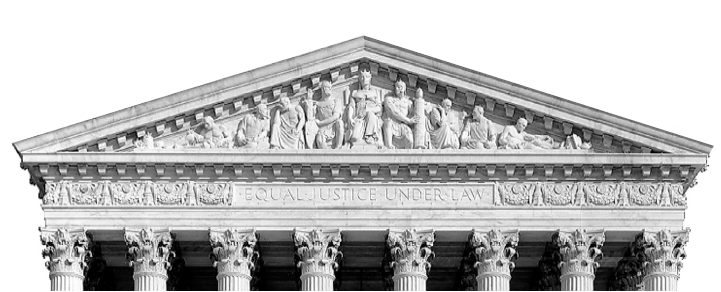
http://www.supremecourtus.gov/about/westpediment.pdf
The pediment on the back of the Supreme Court building, which
you can't see unless you specifically walk around behind the building, shows
three central historical figures. The three figures shown are Confucius, Moses
and Solon. Moses is shown seated in the middle holding two tablets, presumed to
represent the Ten Commandments. The tablets are blank however.

http://www.supremecourtus.gov/about/eastpediment.pdf
Surrounding the Supreme Court are
many figures of Justice represented by the female form. The forms represent
Themis and Justicia. Themis is the Greek Goddess of Justice, and Justicia is the
representation of one of the four Roman virtues: Justice, Prudence, Fortitude,
and Temperance.
All in all the Supreme Court building is hardly a shrine to the
Ten Commandments. There are more pagan images on the Supreme Court building than
Judaic ones, and there are no Christian images at all. The images of the Ten
Commandments on the Supreme Court building were not created
until 1935.
Prior to the building of the current Supreme Court building in
1935, the Supreme Court met in various different chambers. None of these
locations had any images of the Ten Commandments or any religious monuments of
any kind. The early Supreme Court chambers were relatively simple and modest,
like the one shown below, used from 1810 to 1860:

The vast majority of Ten Commandments monuments in America are
the ones dedicated by the Fraternal Order of the Eagles. In total the
FOE produced about 40,000 large and small framed prints of the Ten
Commandments, which they distributed to both public and private institutions
starting in 1951.
In 1955 Cecil B. DeMille was filming the movie The Ten
Commandments and he wrote to the FOE to commend them on their work in
distributing copies of the Ten Commandments. He suggested that they make larger
monuments that could be placed at court houses and public parks, etc.
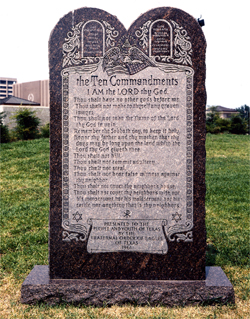
The FOE liked the idea and they worked with DeMille to
promote his movie by unveiling monuments across the country just prior to its
opening, with actors from the movie present at the unveilings. All
in all 145 monuments were dedicated around the country before and after the
release of the movie. The monument at the Texas State Capitol, recently a center
of controversy, was dedicated by the FOE in 1961.
There are a handful of Ten Commandments displays on public
buildings that date back prior to 1935 in America, they are typically on either county or city property and are just
small documents or plaques, typically in obscure places.
The Claims of Roy Moore and his Advisors
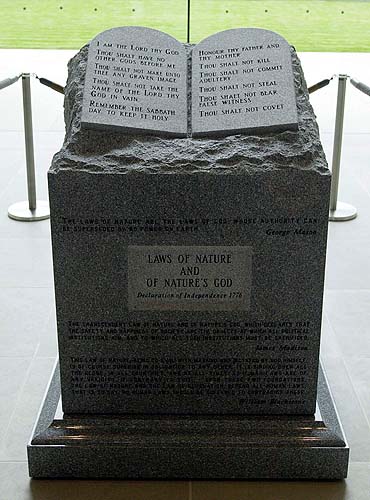
The monument above is the the monument that was placed in front of the
Alabama state courthouse by justice Roy Moore in 2001. The monument was
later ordered removed by the Federal Appeals Court.
The monument itself has several interesting displays. The monument includes
a quote from the Declaration of Independence, written by Thomas
Jefferson and a quote from Sir William Blackstone. Both quotes reference the
"Laws of Nature", and in so doing the monument insinuates that the authors
considered the Ten Commandments to be Laws of Nature. In fact, though,
neither author considered the Ten Commandments to be Laws of Nature, both
authors actually meant the scientifically established laws of nature, such
as gravity, etc. Both Blackstone and Jefferson
specifically made this clear in their writings.
In statements to the press, Roy Moore's legal advisors
presented their case in support of the Ten Commandments display. The article
Moore Advisors Answer Ten Commandments Critics presents the Roy
Moore claims.
But, say Moore’s legal advisors, the role of the Ten
Commandments in the formation of Western law is an historical fact. The
Ten Commandments are the "very fountainhead of the common law" (the body
of law developed in England and followed in America), according to
Herbert W. Titus, founding Dean of the Regent University School of Law
and Government. The monument, provocative to some, simply restates that
historical fact, he says.
Law professor John Eidsmoe adds that "Mosaic law has influenced and
really been the basis for Western law." Eidsmoe, who teaches law at
Faulkner University, cited the 890 a.d. legal code of British monarch
Alfred the Great, which opened with a recitation of the Ten
Commandments. Charlemagne similarly relied on biblical law, he said.
But facts of history aside, should the Ten Commandments play a role in
contemporary law? Yes, says Titus. The Ten Commandments are the "very
foundation of law and liberty in America" and critical to our continued
freedom.
...
Yet another objection to the Ten Commandments is that the Mosaic law has
no place in a pluralistic culture populated not just by Christians, but
Muslims, Buddhists, Hindus, and those of no faith. But that presupposes
that the Ten Commandments is purely religious in nature. Not so, say
Moore’s legal scholars.
""Our position is that the Ten Commandments are not, strictly speaking,
a religious document," said Eidsmoe. "They are a legal code, they are a
civil and criminal code, and they are a moral code that applied to
Israel and have been foundational for other societies."
Herbert W. Titus is a fundamentalist Christian and
Regent University School of
Law and Government is a radical Christian school founded by Pat
Robertson.
Professor
John Eidsmoe is an activist Evangelical Christian and
Faulkner University
is a Christian school.
The legal code of Alfred the Great refers to the documents
already mentioned above by Thomas Jefferson as having been forged by
clergymen after the fact. Indeed, Roy Moore is still using evidence that has
been disproved for hundreds of years as support for his claim that the Ten
Commandments are of critical importance to English law. In Jefferson's
commonplace book he wrote:
Howard, in his Contumes Anglo-Normandes, I. 87, notices
the falsification of the laws of Alfred, by prefixing to them four
chapters of the Jewish law, to wit: the 20th, 21st , 22nd and 23rd
chapters of Exodus, to which he might have added the 15th chapter of the
Acts of the Apostles, v. 23, and precepts from other parts of the
Scripture. These he calls a hors d'aeuvre of some pious copyist. This
awkward monkish fabrication makes the preface to Alfred's genuine laws
stand in the body of the work, and the very words of Alfred himself
prove the fraud; for he declares, in that preface, that he has collected
these laws from those of Ina, of Offa, Aethelbert and his ancestors,
saying nothing of any of them being taken from the Scriptures. It is
still more certainly proved by the inconsistencies it occasions. For
example, the Jewish legislator, Exodus xxi. 12, 13, 14, (copied by the
Pseudo Alfred 13,) makes murder, with the Jews, death. But Alfred
himself, Le. xxvi., punishes it by a fine only, called a Weregild,
proportioned to the condition of the person killed.
Indeed the very laws of Alfred don't follow the Ten
Commandments or Mosaic law and Jefferson went on to list many more examples
of inconsistencies.
Charlemagne was a French king who had no bearing on
English common law.
The Ten Commandments are explicitly stated to be a religious
covenant in the Bible/Torah. They are clearly not a criminal code because
they don't designate any standard for judgment or guidelines for punishment.
All of the historical claims by Roy Moore and his supporters
can be disproved. In addition, the men quoted by Roy Moore's legal advisors
are fellow Christian activists, not traditional legal scholars.
Summary
American law is not based on the Ten Commandments, nor have the Ten
Commandments played any special role in American history.
Indeed, the Founding Fathers made it clear that Roman law and English common
law were the basis of American law, and American
Founders also refuted the claim that either Christianity or the Ten Commandments
were the basis of English common law. Modern historical analysis provides the
same conclusion.
In addition it is clear that the Ten Commandments were not the first laws
known to man, indeed even the Bible itself mentions other laws prior to the
Ten Commandments, which are actually not even laws. The Ten Commandments are
just that - commandments. Immediately following the giving of the Ten
Commandments in the Old Testament/Torah, God gives Moses approximately 42
laws. According to Jewish tradition there are actually hundreds of Mosaic
laws, all of which are claimed to have been given to Moses by God. Not all
of these are in the Christian Bible.
The difference between laws and commandments is that laws can be enforced
by courts while commandments cannot. The commandments are religious by
definition. They are a covenant between the giver of the commandments and the
followers. The only one who can pass judgment on commandments is the one who
gave the commandments. The Ten Commandments don't provide any guidelines for
judgment or standard for punishment, they just say "don't do it".
It is clear that the Ten Commandments are a purely religious covenant
because in Exodus 21, immediately after the giving of the Ten Commandments,
actual laws are given. Instead of saying "You shall not steal", eight or
nine laws governing theft are given, such as:
"If a man steals an ox or a sheep and slaughters it or sells it, he must
pay back five head of cattle for the ox and four sheep for the sheep.
"A thief must certainly make restitution, but if he has nothing, he
must be sold to pay for his theft.
Those are secular laws, because they provide a guideline for human
judgment.
The basis of all Western law stems from Greek and classical Roman law, which
were
not influenced by Judaism or Christianity at all. English law is based on
pre-Christian Anglo-Saxon and Roman law. Mosaic law and Christianity did
have a later influence on European and English law, but it was never the
basis.
The proponents of putting the Ten Commandments on government property
continue to make the claim that doing so would honor the Founding Fathers or
that it would honor our nation's past, yet in no case are any examples
given, because none exist. If the Ten Commandments are such an important
part of American history then where are all the Ten Commandments monuments
from the 1700s and 1800s? Where are the documents that cite the Ten
Commandments as a basis for American law? The one known document
to reference a commandment is the document of Massachusetts colonial law
from 1641, which was later overturned when the colony's charter was revoked
by the Crown of England, and which would have been ruled unconstitutional
after of the signing of the Bill of Rights anyway. Of all the laws in the
Massachusetts document, the only one that cited a commandment was the law
stating that if anyone worshiped any god but the Lord God they would be put
to death.
Clearly, based on even the most conservative reading of the intent of the
Founders and of the Constitution, that is exactly the type of nonsense that
the founding of the United States was in opposition to. The only law in all of American
history that can be traced to the Ten Commandments is a colonial law that is
most blatantly un-Constitutional.
The imposition of the Ten Commandments on American public property is not
representative of our legal heritage, it is not representative of the views
of the Founding Fathers, it has no basis in early United States history, and
it is an attack on the very principles of moderate and diverse government
that the Constitution and Bill of Rights were written to protect.
Ironically, the Bible does provide us with a valuable lesson. Even the
Biblical story of the Ten Commandments presents them as a divisive code of
conduct. Within days of the issuance of the commandments thousands of people
were slaughtered for worshiping according to their own conscience. The very
first punishment meted out for failure to follow the commandments was not for
the failure to follow the "secular" commandments, it was for failure to
follow the two commandments regarding worship.
The very story of the commandments tells us that they pit father against
son, friend against friend, and neighbor against neighbor. This may actually
be the story's most timeless lesson.
Bibliography:
Coquillette, Daniel. The Anglo-American Legal Heritage. North
Carolina: Carolina Academic Press, 1999
Versteeg, Russ. Law in the Ancient World. North Carolina: Carolina
Academic Press, 2002
Watson, Alan. The Evolution of Western Private Law. Baltimore and
London: The Johns Hopkins University Press, 1985
Geary, Kishlansky, O'Brian. Civilization in the West fifth edition.
http://wps.ablongman.com/long_kishlansky_cw_5/0,6472,268318-,00.html
Golash, Deirdre. Timeline of Western Legal History.
http://www.american.edu/dgolash/timeline.htm
Hoffman, Sue. THE REAL HISTORY OF THE TEN COMMANDMENTS PROJECT, OF THE
FRATERNAL ORDER OF EAGLES.
http://www.religioustolerance.org/hoffman01.htm
Note: Bibliography only includes resources that were not already
linked within the body of the article.
See also:
History of the Separation of Church and State in America
|